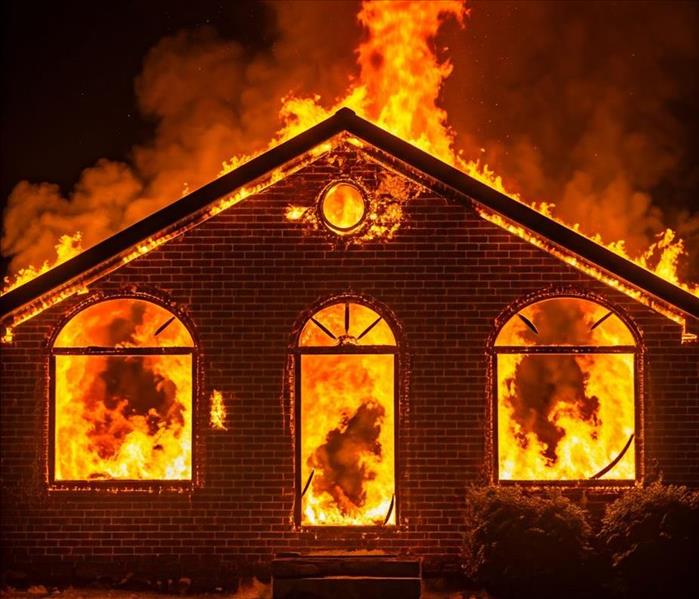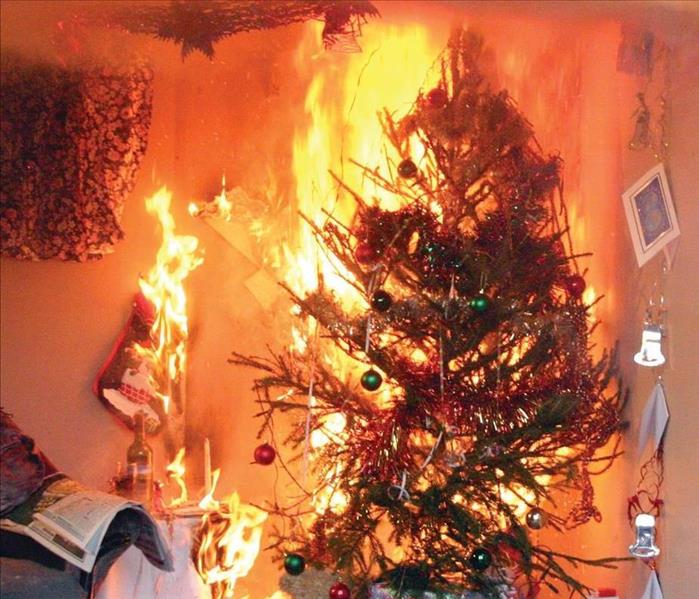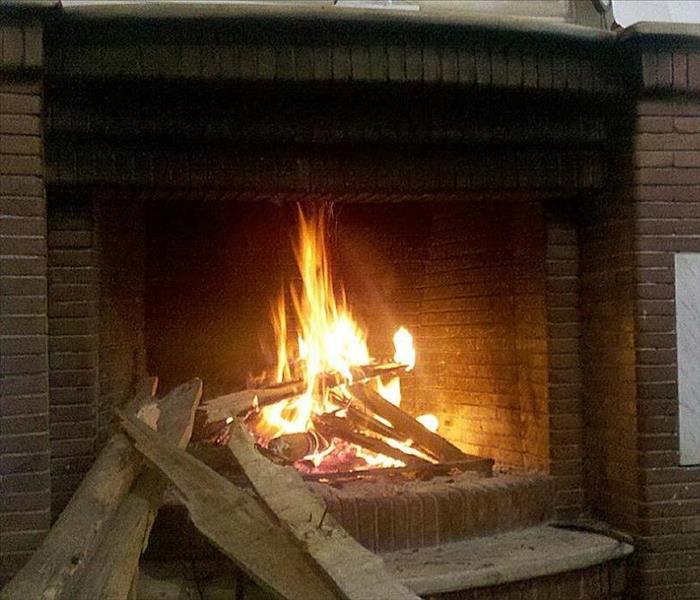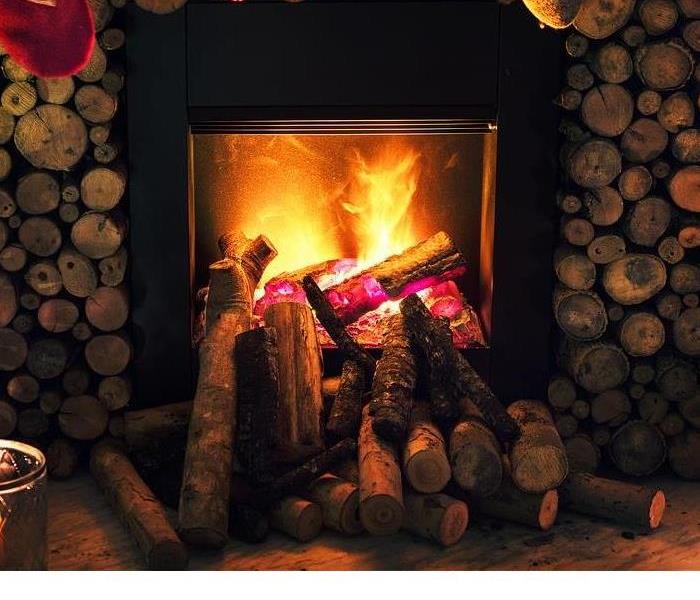Archived Fire Damage Blog Posts
How to Avoid Fire Damage to Your Home During Dry Seasons
1/20/2025 (Permalink)
Dry seasons can be a dangerous time for home fires. The combination of dry weather, strong winds, and low humidity can create the perfect conditions for wildfires to spread quickly. In addition, many people use fireplaces and other heating sources more often during the dry season, which can also increase the risk of fire.
There are a number of things you can do to protect your home from fire damage during the dry season.
Here are some tips:
- Create a defensible space around your home. This means removing any flammable materials, such as leaves, branches, and mulch, from within 30 feet of your home.
- Keep your gutters clean. Clogged gutters can collect leaves and other debris, which can increase the risk of fire.
- Trim trees and shrubs near your home. This will help to reduce the risk of fire spreading to your home.
- Use caution when using fire in or around your home. This includes being careful when using fireplaces, campfires, and grills.
- Install and maintain smoke detectors and carbon monoxide detectors. These devices can help you to evacuate your home safely in the event of a fire.
- Have a fire escape plan. This will help you and your family to get out of your home safely in the event of a fire.
- Consider installing a sprinkler system. Sprinkler systems can help to extinguish fires quickly, which can reduce the amount of damage to your home.
- Be aware of fire restrictions. During the dry season, there may be restrictions on outdoor burning. Be sure to check with your local fire department before burning anything outdoors.
By following these tips, you can help to protect your home from fire damage during the dry season.
Additional tips:
- Sign up for a fire safety course. This will teach you how to prevent fires and how to escape from a fire safely.
- Install a home security system. This can help to deter burglars, who may be more likely to target homes during the dry season.
- Keep your home well-maintained. This includes repairing any leaks or other damage to your home.
- Be prepared to evacuate. If a fire threatens your home, be prepared to evacuate safely.
By following these tips, you can help to keep your home safe during the dry season.
Keep Your Holidays Fire Free
12/2/2024 (Permalink)
The holiday season is a time for joy, family, and festivities. However, it’s also important to prioritize safety. House fires are a common occurrence during this time, often caused by careless actions or faulty equipment. Here are a few tips to keep your home safe and your holidays happy:
Christmas Tree Safety:
- Choose a fresh, fire-resistant tree.
- Keep the tree well-watered.
- Place the tree away from heat sources like fireplaces and radiators.
- Turn off Christmas lights before going to bed or leaving the house.
Lighting Safety:
- Use only UL-listed lights.
- Check lights for frayed wires or broken bulbs before using them.
- Never overload outlets.
- Avoid using candles unattended.
Cooking Safety:
- Never leave cooking unattended.
- Keep children and pets away from cooking areas.
- Keep pot handles turned inward to avoid accidental spills.
- Clean up spills immediately.
By following these simple tips, you can enjoy a safe and happy holiday season.
Preventing Heating Fires
2/8/2024 (Permalink)
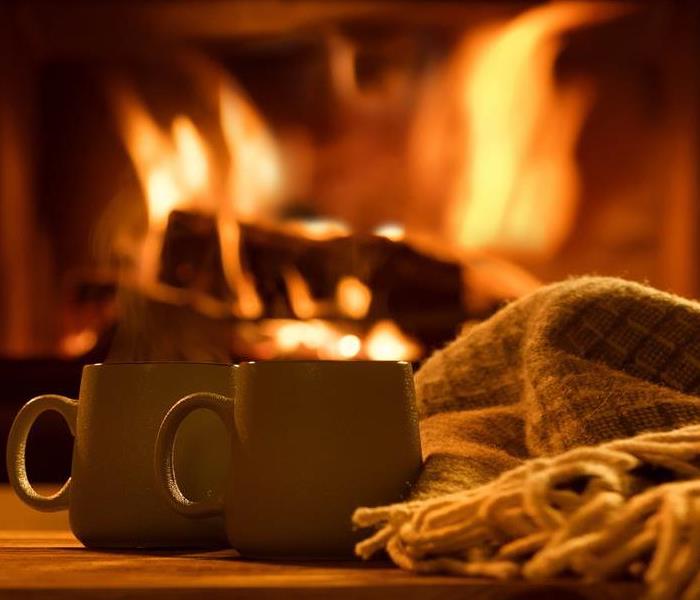 Heat your home safely as the cold outdoor temperatures persist.
Heat your home safely as the cold outdoor temperatures persist.
While modern heating systems are designed to be more efficient and have built-in safety features that minimize the risk of fires, it is crucial to note that heating fires can still occur due to various factors.
Is your property at risk? Let us help you get prepared with our checklist of preventative measures. But remember, if your property does undergo damage, we are open 24/7, 365 days a year to help you through it and to make it "Like it never even happened."
Overall, there has been a decline in heating fires over the years, however, they still pose a significant risk to homes and individuals. By remaining vigilant, staying informed about safety measures, and taking proactive steps to maintain heating systems, we can continue to reduce the occurrence of these devastating incidents.
Checklist for preventing heating fires
- Heat source proximity - Keep anything that can burn at least three feet from all heat sources including fireplaces, wood stoves, radiators, portable heaters, or candles.
- Electrical issues - Always plug space heaters directly into an outlet, and make sure its cord isn’t damaged or frayed.
- Improper usage - Never use an oven to heat your home.
- Maintenance - Maintain heating equipment and chimneys by having them cleaned and inspected each year by a professional.
- More information - Visit the U.S. Fire Administration Home Fires page to learn about how to prepare for and prevent home fires including tips for individuals with disabilities and older adults.
source: Ready.gov
Was this helpful? Leave us a review to let us know!
https://www.wereyouhappy.com/review2/SERVPRO-of-west-knoxville
Fire Prevention for Homes and Businesses
12/7/2023 (Permalink)
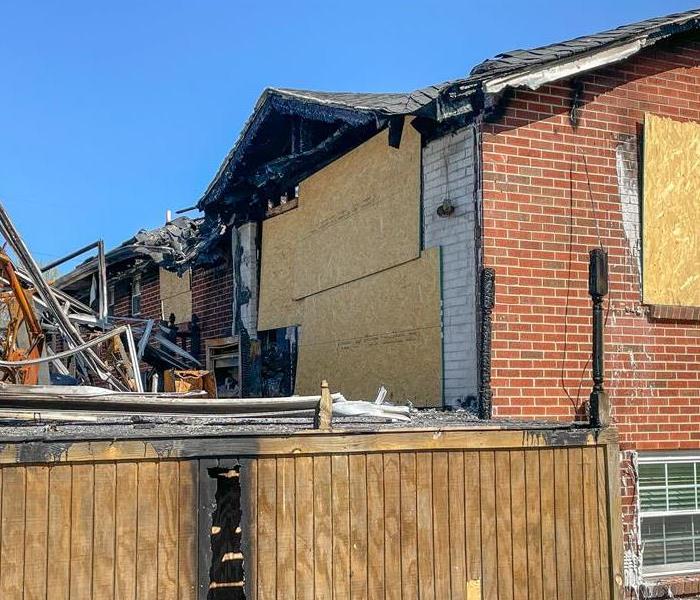 The effects of a fire can be devistating.
The effects of a fire can be devistating.
If you didn't know, it's National Fire Prevention Week. As much as we here at SERVPRO are here to help clean up after fires, our priority is always to help prevent them in the first place. So, we want to share some tips with you that will help keep you and your loved ones safe.
Fire is one of the most devastating disasters that can strike a home or business. It can cause extensive damage to property and possessions, and can even lead to loss of life. That's why it's important to take steps to prevent fires from happening in the first place.
Here are some fire prevention tips for homes and businesses:
Home fire prevention tips:
? Install smoke alarms on every level of your home, inside bedrooms and outside sleeping areas. Test your smoke alarms every month and change the batteries every year.
? Create and practice a fire escape plan with your family.
? Keep flammable materials away from heat sources.
? Be careful when cooking and using candles.
? Never smoke in bed.
? Have your electrical wiring and appliances inspected regularly by a qualified electrician.
Business fire prevention tips:
? Install smoke alarms and carbon monoxide detectors throughout your business. Test your alarms every month and change the batteries every year.
? Create and practice a fire escape plan with your employees.
? Keep flammable materials away from heat sources and electrical equipment.
? Be careful when using appliances and equipment.
? Have your electrical wiring and appliances inspected regularly by a qualified electrician.
How SERVPRO can help after a fire
If a fire does happen, it's important to call a qualified fire restoration company as soon as possible. SERVPRO is a leading provider of fire restoration services. We have over 2,000 franchises across the United States and Canada, so we're always nearby to help when disaster strikes.
Our team of highly trained and experienced professionals is equipped to handle all aspects of fire restoration, including:
? Emergency water removal
? Structural drying
? Smoke and odor removal
? Content cleaning and restoration
? Construction services We work with your insurance company to make the claims process as easy and stress-free as possible. We also offer 24/7 emergency service, so you can always count on us to be there for you when you need us most.
If you have experienced a fire, contact SERVPRO today. We're here to help you get your home or business back to normal as quickly as possible.
Additional fire prevention tips:
? Educate your family and employees about fire safety. Make sure everyone knows what to do in case of a fire.
? Have a fire extinguisher on every level of your home or business and know how to use it.
? Keep your fire extinguishers in good working order by inspecting them regularly and having them serviced by a professional.
? Consider installing a fire sprinkler system. Fire sprinkler systems can help to extinguish fires quickly and prevent them from spreading.
By following these fire prevention tips, you can help to protect your home or business from the devastating effects of fire.
Office Fire Safety 101: Tips for Fire Prevention in the Workplace
12/12/2022 (Permalink)
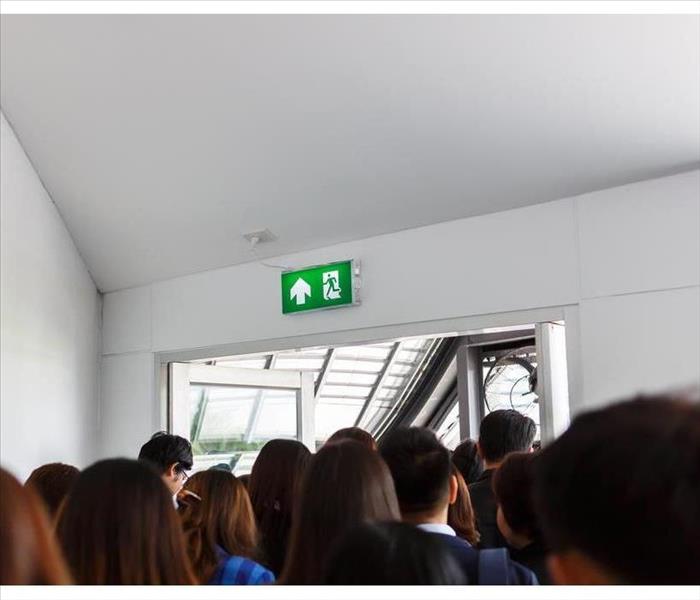 Make sure that everyone knows where the nearest exits are located.
Make sure that everyone knows where the nearest exits are located.
Fires are a risk at any workplace, but individual office environments have their own unique fire safety concerns. Whether you're an employee working in an office building or a business owner who's responsible for your employees' health and safety, it's important to be prepared for the possibility of a fire emergency. Here are some steps you can take to help ensure that your employees stay safe if there's ever a fire in your building:
Common Causes of Fires in the Office
Electrical Fires: Electrical fires are the most common cause of fire in offices. These fires can occur after power surges, electrical malfunctions, or when a circuit overloads.
Smoking: Cigarettes, cigars and pipes all contain burning tobacco products that can easily start a fire if not used with care.
Spills: Spills of flammable liquids like gasoline, solvents and other chemicals should be cleaned up immediately to avoid creating a layer that could ignite later in an unsupervised area.
Cooking: Cooking on hot plates or microwaves is prohibited in many office buildings due to the risk of starting a fire.
How to Get Ready for Workplace Fire Emergencies
Employee training
While it’s important to keep your employees safe, you don’t want them to be so worried about the possibility of a fire that they can't focus on their work. Proper training will ensure that everyone understands the signs of a fire and knows how to respond if one occurs.
Emergency plans
Once you've trained your staff in fire safety, put your plan into action with an emergency drill or two each year. Doing this will help you avoid any confusion during an actual emergency, as well as make sure that everyone knows where the nearest exits are located. If possible, include a mock evacuation scenario in these drills (like having someone play the part of someone who needs assistance evacuating). This way, you can test both how quickly people exit their workplace and whether there are any gaps in their knowledge.
Safety equipment
Fire extinguishers should always be installed throughout every workplace — they're cheap enough compared with other forms of hazard protection like sprinklers or CO detectors.
How to Implement Fire Prevention at Work
As an employee, you should be aware of the importance of fire prevention in the workplace. Your employer is legally required to take certain steps to keep your workplace safe. Fire alarms and extinguishers are two important things that can help keep your employees and property protected from fires.
If you're responsible for a facility, here's what you need to do:
- Install fire alarms that sound throughout the building when activated by smoke or heat
- Make sure they're working properly so they can alert people if there's ever a fire
- Get at least one ABC-rated fire extinguisher per floor or area (you'll want more in industrial areas)
- Train all employees on how to use it
- Keep exit routes always clear
The best way to keep your office safe from fires is to be fully prepared in case one happens. The tips we’ve outlined above can help you prevent fires, but there are also some other crucial steps you can take. First and foremost, make sure that everyone at your workplace knows what to do in case of emergency. Second, make sure that someone is always on hand with a fire extinguisher. Finally, don’t forget about things like regular maintenance checks and replacing worn-out equipment before anything goes wrong.
How To Secure Your Building After a Fire
8/18/2022 (Permalink)
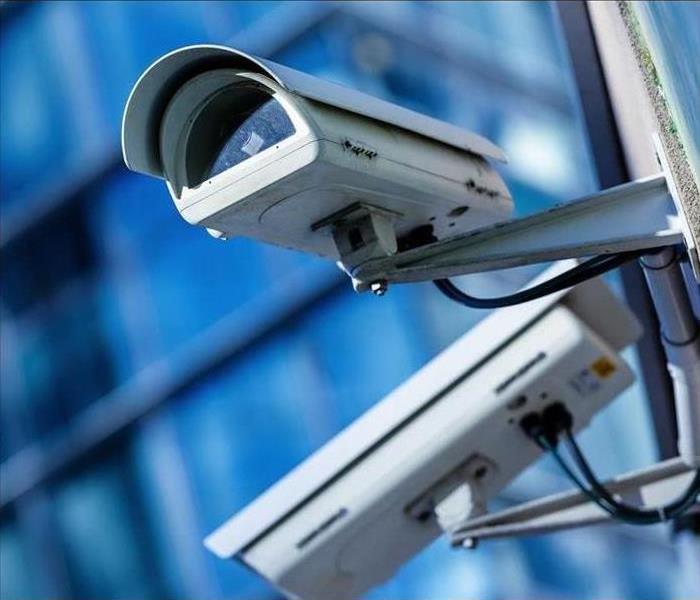 Having a surveillance camera can be helpful after a fire in your property.
Having a surveillance camera can be helpful after a fire in your property.
Several Ways To Secure Your Property After A Fire
A primary concern with commercial property is security. A fire in your commercial building in Hardin Valley, TN, most likely will result in a period of time when conventional security measures are ineffective. Fire damage can include broken windows and busted doors, leaving your building vulnerable to vandalism and looting. There are several ways you can secure your property after a fire.
Surveillance
Sometimes, all potential troublemakers need as a deterrent is the knowledge that they are being watched. There are a few ways to communicate that your property is under surveillance:
- Cameras
- Security lights
- Professional guards
Hiring guards can be expensive, and you may have to hire more than one to secure the entire property. Cameras and lights are only effective if the trespassers notice them and are concerned about getting caught. While surveillance footage can be helpful after the fact, you probably need to employ other means to further secure your property.
Fencing
A security fence provides a clear barrier around your building. It takes a little more effort to get past a fence than it does to just walk up to a building that it left unguarded. A fence can also prove to your insurance company that you are doing what you can to limit problems to actual fire damage.
Boarding
Broken windows and doors leave a gaping hole through which those with ill intent can enter. The easiest way to secure your property during the fire cleanup process is by boarding up doors and windows. Many mitigation professionals will often board up your property for you as part of the emergency services they provide when they first arrive.
Security is important during cleanup. Knowing you have done everything you can to secure your building, from surveillance to putting up actual barriers, can give you some peace of mind while you are waiting for the fire damage to be repaired.
Can You Clean Smoke-Damaged Electronics?
5/25/2022 (Permalink)
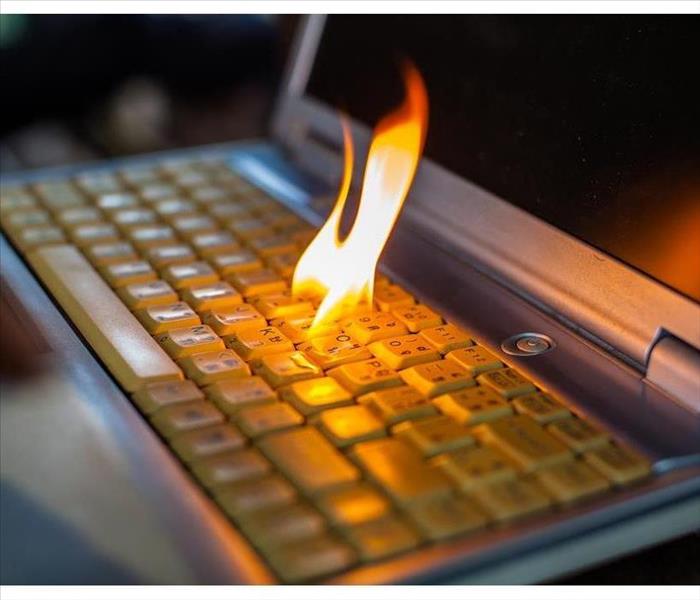 Computers can suffer from smoke damage.
Computers can suffer from smoke damage.
The aftermath of a fire at your Northshore Town Center, TN, home can feel overwhelming. Many of your belongings may have suffered untold damage, including your valuable electronics. Fire cleanup efforts for these items are usually different from other belongings because of their delicate components, but there are several ways a professional restoration service may be able to help.
The Effects of Smoke on Electronics
Computers, televisions, tablets and even cell phones can suffer from smoke damage, even if they were not outwardly affected by the heat from a fire. There may be problems you cannot see, including:
- Wiring and insulation damage caused by soot
- Corrosion of internal components
- The possibility of a short circuit from magnetic charge
These unseen problems may pose a danger to you or other users, so having the electronic items examined by a fire cleanup and restoration service may help you salvage them properly.
The Cleanup Process
The first step your restoration technicians may take is to gauge the amount of visible damage and manage that first. For example, if your laptop has visible soot on the keyboard and screen, your techs will probably use commercial-grade cleansers to clear it away. Allowing your techs to examine your electronics and perform fire cleanup on them may prevent the items from shorting out and rendering them useless.
Listing the Damage
Most electronics carry significant value, so you may want to keep a running list of which can be salvaged by your restoration service and which cannot so you can enter a claim to recoup your losses. Remember to include a copy of the sales receipt for each item and a photo so your insurance company can compensate you properly.
When your Northshore Town Center, TN, home suffers fire damage, your electronics may need different fire cleanup techniques than your other belongings. Having them examined and cleaned by a restoration service can give you peace of mind when it comes to caring for these valuable items.
This Is the Smoke Alarm You Need
4/17/2022 (Permalink)
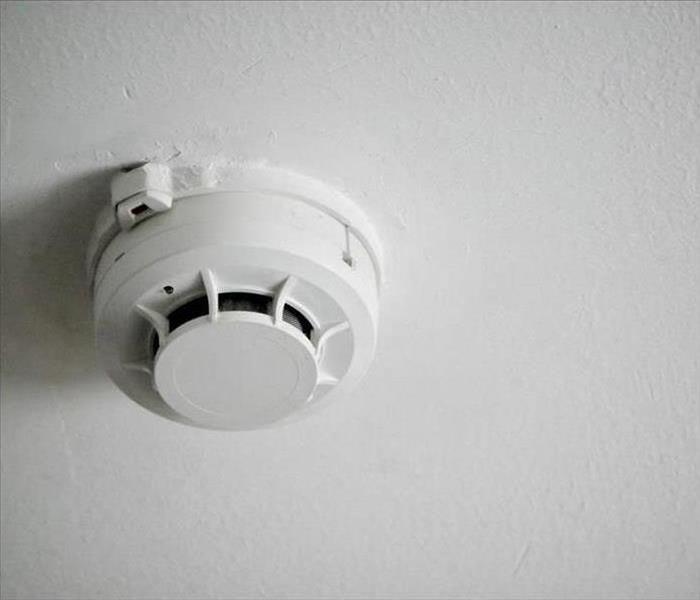 Pick the right smoke alarm and test it monthly.
Pick the right smoke alarm and test it monthly.
How To Choose The Right Smoke Detector
You probably think that simply installing any smoke alarm in your home is enough. However, there are several options to choose from. Read on to find out how to choose the right smoke detector for your particular residence.
1. Consider the Size of Your Home
A bigger home will need more units. When purchasing, consider:
- Number of rooms
- Square feet
- Sleeping location
- Special needs
You need to put a smoke alarm in each room, as well as the hallways leading to bedrooms. Also factor in attics, basements, and both ends of staircases. Essentially, make sure you'll be able to hear the alarm at any time of the day.
2. Choose a Type
If you have a larger residence, you should look into devices that can be wired along with the same network.
Ionization
Photoelectric
Dual-sensor
Air-sampling
CO2 combo
There may be regulations in Hardin Valley, TN, so make sure to check before installing. Often, these regulations can require hard-wired devices. If this is the case, you have to have them installed by local fire prevention and remediation specialists.
3. Make Sure It Works
This may seem obvious, but you need to test your smoke detectors. Think about fire safety. You may only have 2 minutes to evacuate. Does your alarm do its job in time? Check if batteries need replaced. If your system is hard-wired, it may also have backup batteries. Make sure these are in working condition. Keep in mind that placement should also be conducive to monthly testing. If you can't reach the alarm or don't have a ladder, reconsider placement. You should also keep units free of dust and grime that may inhibit usefulness.
Further, look for the circle logo on your units or their packaging. There should be a "UL" denoting that they have been tested and certified by Underwriters Laboratories. This is the most common certification, but there are others. Always do a quick internet search to verify your alarm's standard testing.
If you pick the right smoke alarm and test it monthly, you are doing the best that you can for fire prevention. Practice how to turn off the alarm without dismantling it from the wall or ceiling. Stay safe.
How To Safely Extinguish a Grease Fire
2/27/2022 (Permalink)
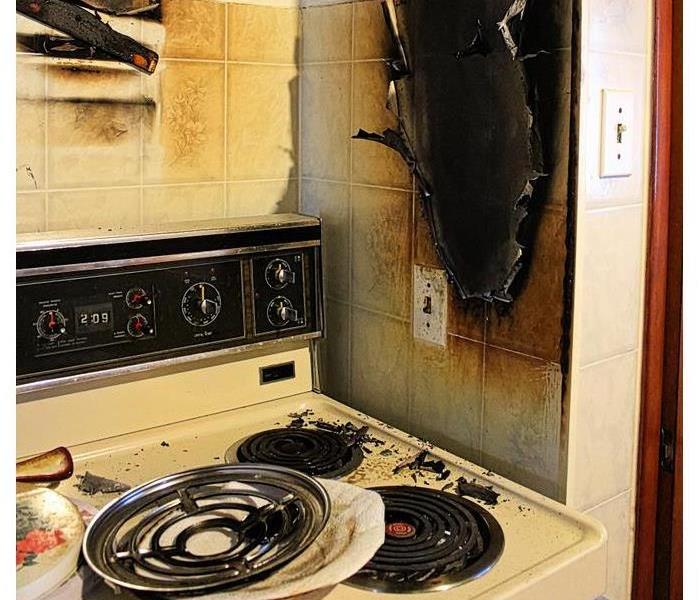 Dealing with a grease fire in your home in Blue Grass, TN, is a terrifying experience.
Dealing with a grease fire in your home in Blue Grass, TN, is a terrifying experience.
How To Put Out a Grease Fire In Your Home
For many homeowners, one of the greatest joys you can have is cooking homemade meals. However, that joy can quickly change to fear when facing a fire. Regardless of your experience in the kitchen, a fire can happen to anyone at any time. As a result, everyone needs to be familiar with the process of extinguishing one. The following is a step-by-step guide to putting out a grease fire in your home:
1. Eliminate the heat source. The first step you need to take is removing the heat source by turning your burner off or unplugging the stove. This will help keep the fire from getting out of control. Be sure to wear oven mitts to avoid burns.
2. Smother the flames. The best method for eliminating a stovetop or oven fire is to smother it by putting a lid over the pan. This quickly cuts off the oxygen supply. Make sure to use a lid that is not made of glass, as the intense heat can cause it to shatter. Another option is to use baking soda and pour a generous quantity on the fire. If you own a fire extinguisher, you can use this as a third option. Never use water on a grease fire, as oil and water do not mix, and this can cause an explosion.
3. Call 911. If the above steps do not eliminate the fire, or if it spreads, call 911 immediately and evacuate everyone in the residence. Do not stay and continue to attempt to put out the fire; your life is much more important.
Dealing with a grease fire in your home in Blue Grass, TN, is a terrifying experience. By arming yourself with the knowledge of how to properly handle one before it starts, you can get it under control and prevent too much damage from occurring. Afterward, fire restoration services can help you with fire cleanup and assess any damage.
Cigarette Smoke Can Be Tough To Get Rid Of
12/31/2021 (Permalink)
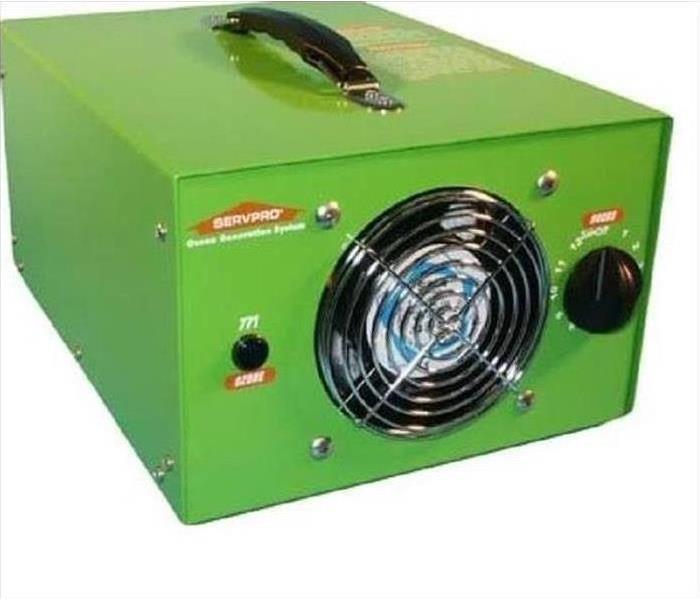 Ozone is often the choice of professionals.
Ozone is often the choice of professionals.
Cigarette Smoke Can Be Tough To Get Rid Of
Many people smoke cigarettes without realizing that the odor can have negative effects on their home environments. Smoking can cause odors to linger inside the home. This is because smoke and fine particulate matter become trapped inside soft surfaces and porous materials such as these:
- Furniture
- Drapery
- Clothing
- Carpet
- Throw rugs
- Bedding
- Towels
Other surfaces can trap odors, too. Over time the odors can become quite overwhelming; correcting it can call for professional home deodorization. Thankfully, professionals have a range of specialized tools available to them that help them accomplish this important goal. Whether you are planning to sell your Rocky Hill, TN, home or simply want to give it a much-needed deep cleaning, home deodorization can be an excellent decision that can increase your family’s comfort.
Smoky Smells Can Decrease the Value of a Home
Cigarette removal should be part of the process of preparing a home for sale or viewing. Many people find the smell of old cigarette smoke objectionable, and so they are less likely to purchase a home with this feature. As a result, a home’s value can drop to a surprising degree because of detectable odors. Freshening a house from time to time is usually a good idea. This process can prevent smells from lingering too long and becoming increasingly more established within the soft and porous surfaces found throughout the house.
Ozone Does the Trick
Ozone is typically a powerful natural deodorizer run by a generator that helps capture scent-causing molecules at their very source. It is used in many professional remediation jobs, including deep home cleaning. Ozone is often the choice of professionals, and care should be taken in its application; for this reason, ozone products and technology are not usually available to the general public.
Experts Can Help
A team experienced with home deodorization can help the next time you need to remove cigarette smoke smells from your Rocky Hill, TN, house. Thi
How To Mitigate Fire and Water Damage
11/23/2021 (Permalink)
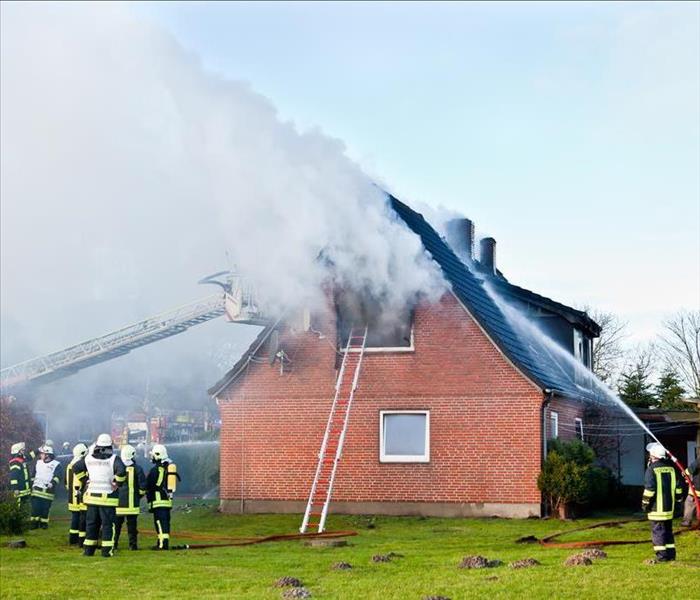 Home exposed to water and fire damage in Farragut, TN.
Home exposed to water and fire damage in Farragut, TN.
How To Mitigate Fire and Water Damage
Firefighters rely on hoses that are capable of dispensing between 300 to 800 gallons of water per minute or more, depending on the hydrant and fire hose. As a result, fire suppression efforts often lead to a combination of extensive fire and water damage in homes in Farragut, TN. Specialized mitigation and restoration methods are necessary to prevent the primary fire damage from becoming rapidly compounded and exacerbated by water. A company that specializes in both types of damage should pursue these three measures to mitigate damage.
1. Remove Water
The water used to put out a fire starts as clean, treated Category One water. Exposure to ash, soot, and smoke quickly degrades this water to Category Three flood water. A mitigation service will start by pumping out the water used for fire suppression.
2. Replace Materials
When no standing water remains, restoration experts can determine which building materials are capable of being cleaned or repaired and which need to be replaced. They will have to assess materials damaged by fire, water, or a combination of these two factors. This process will take longer than restoring either type of damage alone, as water can rapidly intensify the staining that results from fire damage.
3. Prevent Damage
In addition to concerns about structural integrity and air quality, water damage also introduces the risk of mold growth. A service specializing in both types of damage can take measures to ensure that no rebuilding occurs until the location is clean and completely dry, which can lower the likelihood that mold will develop.
If your home has been exposed to damage from both fire and water, rely on skilled restoration professionals with the experience and equipment to address all of the factors involved. Act quickly to notify your insurance provider and contact a water and fire damage restoration service in Farragut, TN.
4 Dos and Don'ts of Putting Out a Grease Fire
10/21/2021 (Permalink)
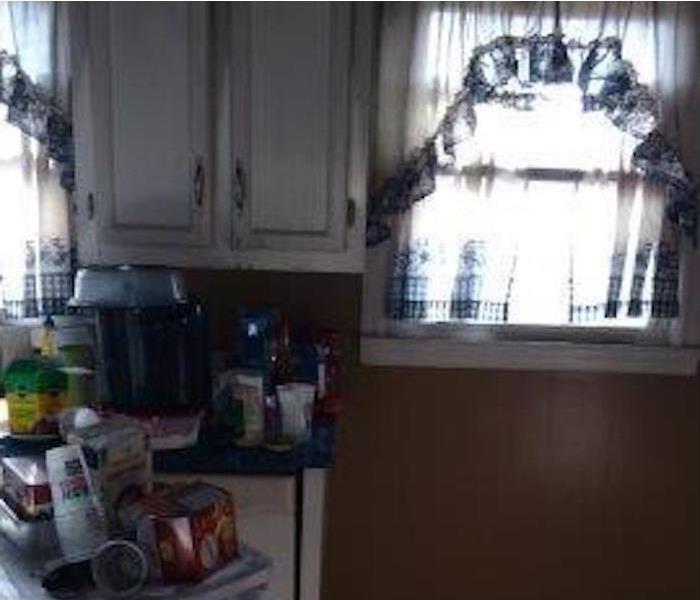 Kitchen fire damage in Bearden, TN.
Kitchen fire damage in Bearden, TN.
4 Dos and Don'ts of Grease Fire Extinguishment
Cooking a tasty meal in your Bearden, TN, home can be an enjoyable way for you to express your creativity. However, stovetop cooking can present some dangers, especially when you use frying oils. If a grease fire should break out, knowing how to react and what to avoid can prevent the blaze from spreading and allow you to extinguish it quickly.
1. Do Not Move the Pan or Pot
If a pot or pan should catch fire, avoid trying to grab the handle or moving the container off the fire, even with a potholder. The movement might cause the burning oil to splash and spread the blaze. Turn off the burner instead and step away from the stove until the danger has passed.
2. Do Cover the Fire
If the fire is small, cautiously cover it with a metal lid. This should snuff the grease fire by leeching the oxygen from it. Avoid removing the cover until the pot or pan cools. If your appliance, walls or ceiling have sustained damage, call in a fire cleanup and restoration company to inspect the area and advise you about repairs.
3. Do Not Use Water on the Fire
While your first instinct may be to throw water on a stovetop fire, doing so can spread it quickly and increase the risk of burns from splashing. If the fire is contained within the pan, you can put it out with baking soda or a small kitchen fire extinguisher.
4. Do Call 911 Right Away
If you cannot stop the fire from spreading, evacuate your home immediately and call 911 from a secure location once everyone exits. Trying to contain a spreading fire on your own is highly dangerous and may result in serious injury.
Your Bearden, TN, home’s kitchen can be a source of culinary joy and adventure. However, it also comes with potential risks, such as the outbreak of a grease fire, but knowing how to react can prevent a larger blaze and allow you to contain it safely.
Quick Guide To Cleaning Your Belongings
7/22/2021 (Permalink)
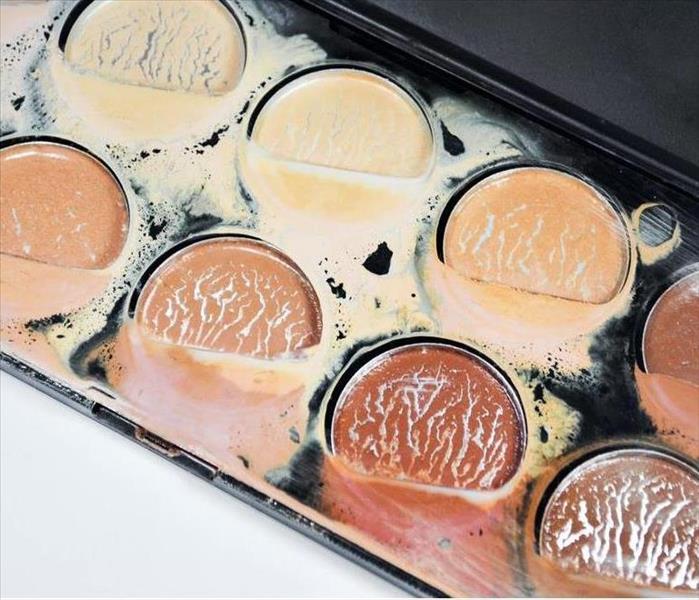 High heat fires can permanently damage a lot of your belongings.
High heat fires can permanently damage a lot of your belongings.
Cleaning Your Belongings: A Step-By-Step Guide
After a fire tears through your Deane Hill, TN home, you have a lot of work to do. Not only do you have to make repairs to your damaged house, but you also have to start cleaning your other possessions. When you work with a fire cleanup professional, you can easily figure out what to do with each unique item. Use this quick guide to help you figure out what you need to throw away and what you can salvage.
Get Rid Of
There are certain things you won't want to throw out, but the truth is that high heat fires can permanently damage a lot of your belongings. Certain items, including the following, cannot be saved:
The drastic heat from the fire can alter the makeup of these items. If you try to eat food that has been super-heated, you may find a melty mess that has started to absorb some of the outer wrapping. It's best to simply throw away these items and start over.
The professionals you work with may try to salvage some of your porous belongings, like clothing and furniture. Sometimes dry-cleaning methods can remove the soot and odor. However, this category of items may also need to be thrown away.
Keep
Some of your possessions can get cleaned by your professionals. Some porous items can be saved with the proper content cleaning and restoration. Often, non-porous and non-perishable items can also be saved after fire damage. You will have to have almost all of your belongings professionally cleaned to ensure the soot and odor is removed. If you leave the soot on electronics, you may end up causing more damage when you go to use the item.
Figuring out exactly what you can keep and what you need to throw away can be challenging. Some items may have sentimental value for you, but it may still be best to get rid of the artifact. Professionals can often help you determine what can be saved and what's beyond repair.
Can Lightning Start a House Fire?
7/12/2021 (Permalink)
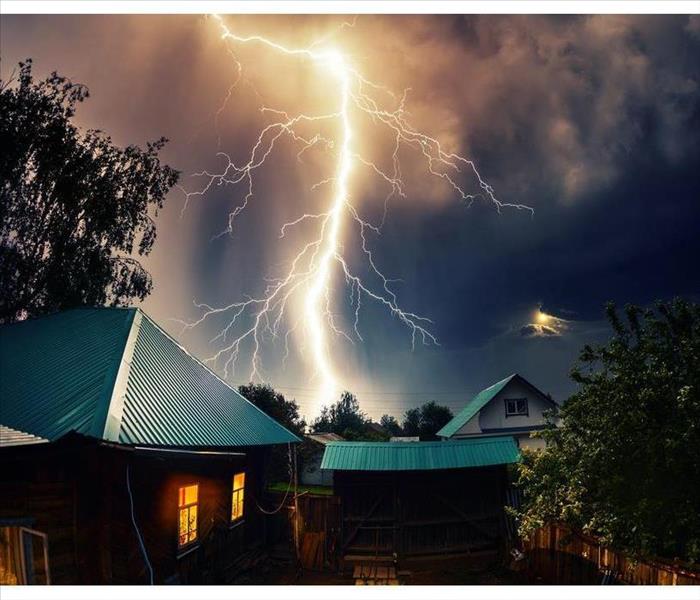 Lightning is the cause of a number of house fires every year.
Lightning is the cause of a number of house fires every year.
Can Your House Catch On Fire From Lightning?
Lightning is the cause of a number of house fires every year. A lightning fire typically occurs when a hot flash strikes a combustible object or travels through conductive metal objects and then ignites combustibles. It is important to recognize the risks of a direct strike and a phenomenon called side flash in order to safely respond to a strike on or around your home. It is almost always a good idea to call the fire department if your home has been struck.
1. Direct strike: A direct hot strike can cause a fire, particularly if it makes contact with combustible material in or around your home. As soon as your home is struck, check for any signs of fire and contact the fire department from a cellular phone as soon as possible. Avoid using a landline in case the current is traveling through the wiring. You can rest easy once you are sure that your residence is not running an elevated risk for lightning fire.
2. Side flash: This phenomenon occurs when a strike travels through conductive metal features such as downspouts, gutters, gas lines, water pipes, window frames, or wiring and then ignites combustible building materials such as insulation. Lightning does not require conductive objects to travel down to the ground, but if a side flash occurs, it may lead to hidden fires within the attic or walls of a house.
Whether a direct hot strike starts a fire or the transmission of current through materials in your home in the event of a side strike ends up igniting combustible materials, only the fire department can ensure that your home is safe. A hidden house fire can put homeowners at risk and cause extensive damage prior to being detected. If your home sustains damage from a lightning fire, contact a company that provides fire restoration services in Hardin Valley, TN.
Fire Damage to Structures
6/3/2021 (Permalink)
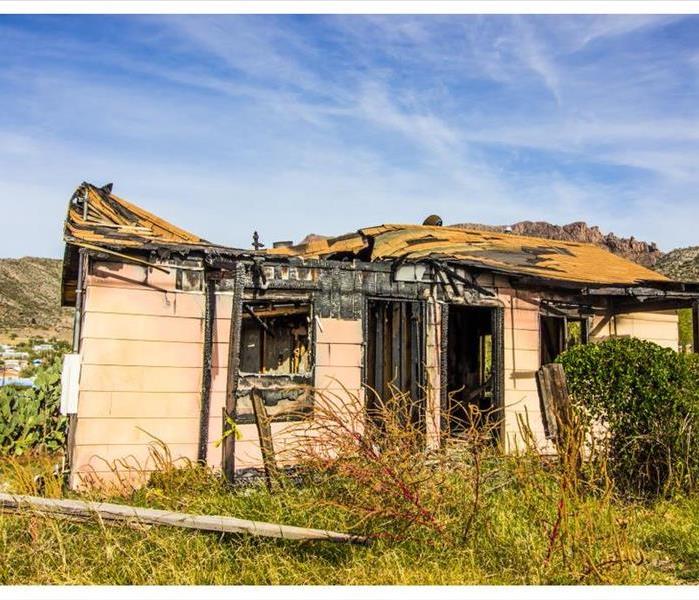 Severe fire damage incidents can lead to visible marks and blemishes on the outside of your property.
Severe fire damage incidents can lead to visible marks and blemishes on the outside of your property.
In the wake of a residential fire, the primary focus is on repairing the damage done to the inside of the house. However, moderate to severe incidents can lead to visible marks and blemishes on the outside of the building too. It is why SERVPRO conducts a full inspection of fire-damaged properties before we start any restoration work.
The good news is that stains on masonry, concrete and other structural materials are almost always superficial. While brick and concrete are not impervious to fire damage in Knoxville homes, they are extremely sturdy and don’t succumb easily to heat. It means that, in most cases, we can use straightforward cleaning techniques to restore the outside of the property.
Light Stains
If there is no structural damage to the masonry, the SERVPRO technicians use mild cleaning agents to wash soot and smoke deposits from the surface. Where the staining is very light, dry sponging is enough to wipe away grime on block, brick, and concrete. Stubborn marks get lifted with alkaline detergents and direct scrubbing. Sodium hypochlorite is highly effective when it comes to soot removal, and it leaves no residues.
Moderate Stains
The difficult thing about soot is that it can be highly acidic. If it is not removed quickly, particularly from structural materials, there is a chance of corrosive residues becoming embedded deeper and deeper into the masonry. It is why SERVPRO pays close attention to cracked joints.
They are delicately cleaned and repointed to dislodge any soot deposits which may be trying to move into the capillaries. Once this is complete, larger areas are dry sponged and vacuumed. Then, they are jet washed with a high powered pressure cleaning device.
Heavy Stains
The most severe staining occurs when heavily combustible materials have caught fire and burned for some time. In some cases, jet washing is still a suitable method of cleaning. We can add soot dissolving formulas like high PH degreasers, dry ice, or soda ash to increase optimal results.
SERVPRO rarely recommends sand blasting for brick, block, and concrete because it is a very abrasive process and can cause additional damage. If there are smaller patches of masonry which are heavily soiled, the technicians may apply a poultice (sodium hypochlorite and diatomaceous earth). It takes 24-48 hours for the formula to take effect.
The great thing about a fire damage restoration company like SERVPRO is that we offer a complete package. We are part of a huge network of contractors, so there is no repair job too big for our team to handle.
3 Tips To Prevent a Dryer Fire
3/22/2021 (Permalink)
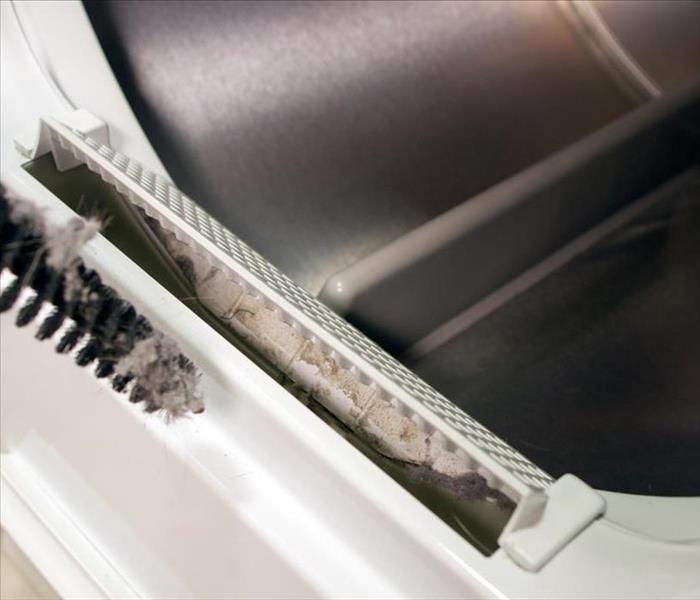 Twice a year, brush the filter thoroughly with a nylon brush to remove difficult lint fibers.
Twice a year, brush the filter thoroughly with a nylon brush to remove difficult lint fibers.
Tips On Maintaining Your Dryer In Good Condition
If you’re like most people in Bearden, TN, you probably use your clothes dryer at least a few times per week, but when was the last time you cleaned out your dryer’s exhaust vent? According to the U.S. Fire Administration, clothes dryers cause approximately 2,900 home fires each year. The top cause of those fires is excessive lint buildup due to inadequate cleaning. Follow these tips to keep your dryer in good condition and reduce your risk of a lint fire.
1. Keep Up With Regular Dryer Maintenance
Make sure to clean your dryer’s lint filter every time you use the dryer. Every three months or so, remove any built-up lint from the back of the dryer and clean out any that has accumulated in the vent pipe. Twice a year, brush the filter thoroughly with a nylon brush to remove difficult lint fibers.
2. Remember To Check Your Outside Dryer Exhaust Vent
Nearly all dryers are required to vent to the outside of your house. Keep a cover on the outside vent opening to keep dirt and rain from entering the vent. Check the cover occasionally to be sure it opens fully when the dryer is running. Make sure that birds, insects, or other animals do not build nests that could obstruct the exhaust vent. A clogged vent could lead to a lint fire.
3. Call a Professional if Problems Arise
If you discover any unusual sounds or smells coming from your dryer or notice that your clothes are taking longer than usual to get dry, don’t wait for an inconvenience to develop into a major problem — or a dryer fire. Call a repair person who is licensed to work on your model of dryer. The cost to repair your dryer correctly will almost certainly be less than the fire cleanup costs after a home fire caused by a malfunctioning dryer.
Following these tips requires a small investment of time and energy. However, preventing a lint fire from destroying your home is well worth the extra effort.
7 Chimney Safety Tips
11/30/2020 (Permalink)
As the days get shorter and the temperature drops, you may start thinking about cozying up to the glow of a crackling fire in your home. But the jolly moments the holiday season can bring can quickly be spoiled if you suspect a problem with your fireplace and begin to worry. Here are seven chimney and fireplace safety tips provided by insurance providers to proactively address potential problems.
- Get it inspected.
The Chimney Safety Institute of America recommends that chimneys, fireplaces and vents be inspected annually and cleaned or repaired, if necessary. In addition to cleaning, a professional chimney sweep should be able to check your chimney for cracks or loose bricks.
- Keep it clear – inside and out.
Inside, keep papers, decorations, curtains and other flammable objects away from the fireplace. Outside, hire a professional to trim any trees that are overhanging your house or too close to your chimney. It’s best to have tree limbs as far from your chimney as possible.
- Install a chimney cap.
Think of it as a hat for your chimney. It helps to keep out extra moisture from rain and snow. It will also help to keep out animals that may be looking for a place to build their new home.
- Use a screen or doors.
It’s important to be protected from flying sparks and embers — even if the fire will be monitored by someone the entire time. Whenever you’re using your fireplace, be sure to close the glass doors or draw the wire screen mesh curtains closed.
- Keep it clean.
Excess ash in the fireplace can reduce airflow to logs, which creates more smoke. Always use caution when disposing of ashes as they can remain hot for extended periods after a fire appears to be out. Just to be on the safe side, think of all ashes as hot coals.
- Use caution with ashes.
When you dispose of your ashes, use a covered metal container and wet them down. Don’t add anything combustible to the ash bucket or store it near anything combustible. Allow it to sit outside, for at least three days before disposing of them. Make sure it’s somewhere where it can’t be knocked over by winds or animals, and away from combustible materials and buildings.
- Start smart.
Be certain to keep your fireplace damper open when starting a fire. This will help prevent smoke from backing up into your home or lingering in your fireplace. A properly opened chimney flue will minimize creosote buildup and help prevent internal chimney fires.
While these chimney and fireplace safety tips should help to reduce the chance of an accident, this is not a comprehensive safety guide. SERVPRO of West Knoxville wants our community and customers to be prepared. Click here to read about a recent fire in Knoxville that was caused by the chimney, luckily no life was lost and the home didn’t suffer extensive damage. Always observe safety precautions when using your fireplace and be aware of any changes in the way your fireplace operates – it could be a warning sign.
How You Can Safely Keep Your Home Warm This Winter
10/8/2020 (Permalink)
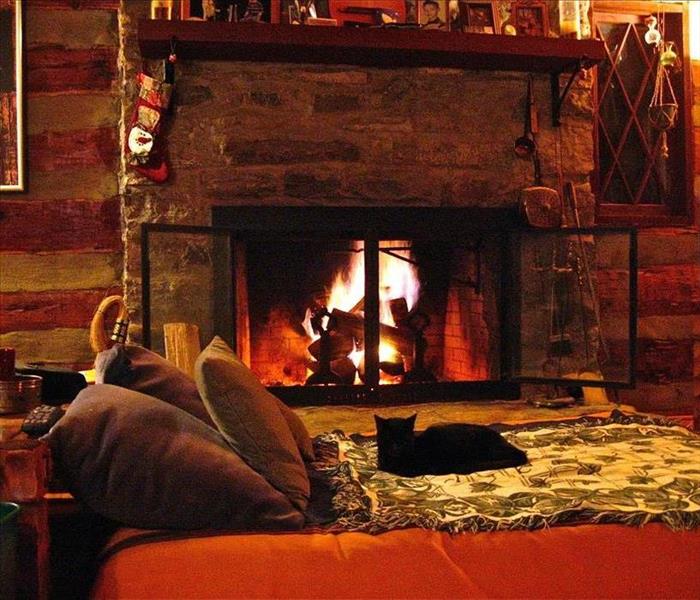 We want you and your family to be safe this winter!
We want you and your family to be safe this winter!
Here at SERVPRO of West Knoxville, we enjoy staying warm and cozy just as much as anyone else. With the winter season coming, also brings cold temperatures.
We want to share some tips on how you and your family can keep your home warm safely, as well as inform you about where there can be an additional fire risk.
- The heat from the sun is free so make the most of it. Open your curtains and let the sunlight in during the day to make use of this free heat. When it gets dark, shut your curtains, which act as another layer of insulation and keep warmth in your rooms.
- It might feel great to have your favorite seat in front of the radiator, but it’s absorbing heat that could be warming your home. By moving it away from the radiator, hot air can circulate freely. The same goes for your curtains or drying clothes – keep them away from the radiator so that you can get the most out of your heat source.
- Rugs not only work to style a room, but they also do a good job of keeping your feet toasty if you have tile or hardwood flooring
- When you’re done baking and turn the oven off, leave the oven door open. The heat will flow into the kitchen and help warm up the room. Of course, don’t ever do this if you have children, pets, or elderly house guests unless you can securely close off the kitchen.
- If possible, leave the door open when you shower. This allows all that hot steam to travel through the house. It can also help cut down on dry winter air.
Now we want to share some tips on how to minimize the chances of fire when using the more traditional items to keep your house warm this winter.
- Check the product label. Make sure your electric blanket is certified by a national testing laboratory, such as UL. You can also check the Consumer Product Safety Commission to make sure your electric blanket has not been recalled.
- Keep the blanket flat while using it. Folds or bunched-up areas can create and trap too much heat.
- Think about an electric blanket with auto-shutoff. If your blanket doesn't have a timer, turn it off before going to sleep.
- Place the heater on a hard, level, and nonflammable surface. They are intended to sit on the floor, not on a table.
- Unplug the heater when it’s not in use by pulling the plug straight from the outlet. Check the cord for damage periodically, and don’t use the heater if the cord is frayed or worn.
- Don’t plug another electrical device or an extension cord into the same outlet as a heater—that can cause overheating.
Prefect Your Home From Fire Damage
7/6/2020 (Permalink)
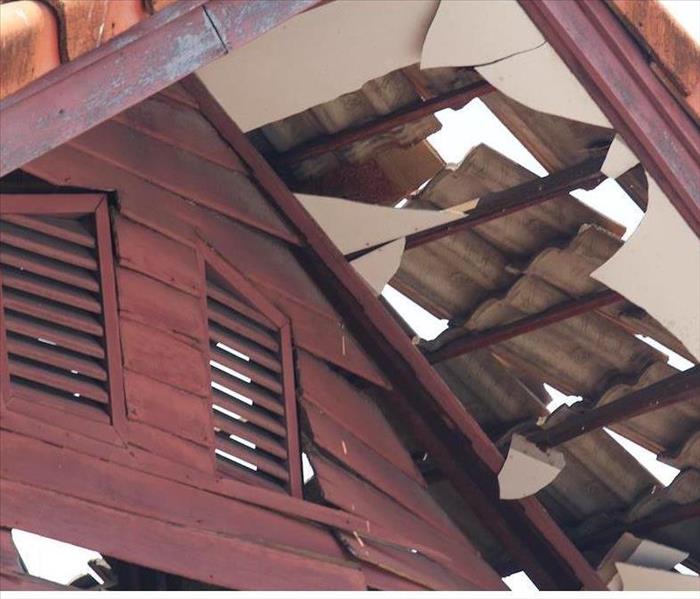 Fire Damage in Knoxville Home
Fire Damage in Knoxville Home
SERVPRO Restores Fire and Smoke Damage Quickly to Ensure Life in Your Seattle Home Gets Back to Normal
Regardless of the scope of a house fire, the levels and layers of damage can be immense. Many homeowners are best off seeking another place to stay when their Knoxville home is restored. Not only is there odorous soot and debris that gets tracked through the house, but there is the potential for breathing in harmful irritants found in soot and smoke residue. The good news is that our trained and IICRC-certified technicians are available 24/7 to address any fire emergency you may have.
Why Do I Need Professional Cleanup for a Small Fire?
Our team at SERVPRO has the skills and equipment necessary to handle your fire and smoke damage quickly in Knoxville efficiently. Many airborne soot particles can be invisible to the naked eye. A significant element of fire loss mitigation is the use of advanced equipment that helps to capture all particulates. Some of the methods that we use include actions like:
- Odor-control material that helps to neutralize odors from the fire
- Total removal and disposal of debris and charred items to cut back on odors
- Deployment of air scrubber technology, which helps to improve air quality while mitigation takes place
How Can You Prevent Debris and Grime from Getting Tracked Throughout My Home?
In many cases, our team partitions off the fire loss zone from the rest of your interior to limit cross-contamination. It is vital to remove charred building materials and any non-salvageable items carefully and meticulously to prevent tracking. Our crew also wears personal protective equipment (PPE) and foot coverings to cut back on cross-contamination from one room to the next.
After Extinguishing the Fire, Everything is Wet, Now What?
From the moment that our crew arrives on your property, we assess the damages, which includes looking at all areas where water or chemicals from extinguishing the fire may be present. During cleaning up debris and controlled demolition methods, we also use different tools to locate hidden moisture, including:
- Moisture sensors
- Moisture meters
- Thermal imaging
We carefully of any saturated, non-salvageable materials, and our team uses targeted drying with the help of industrial-strength fans, air movers, and dehumidifiers.
What is a Controlled Demolition?
Depending on the amount of fire damage to your Knoxville building materials, controlled demolition might be a necessity. This process can often save homeowners a considerable amount of money by carefully removing damaged materials and replacing them with brand new items. If you have charred wooden studs, we have a variety of harsh measures to remove it. Everything is then treated with a special sealant to keep odors from permeating throughout your interior.
What is Done for Smoke Odors?
SERVPRO has a specific process that allows us to remove odorous smoke particles and soot from your home after a fire loss. Every step helps break down stubborn residue while also pinpointing specific areas where particles might have wandered.
- We offer pack-out services to remove furnishings and personal belongings to clean and deodorize offsite. This service limits the amount of smoke residue transfer into other unaffected areas of your home.
- We carefully begin cleaning any surfaces covered in soot residue, ensuring that no area gets left untreated. Our trucks house EPA-approved disinfectant solutions and cleaning agents that remove waste from various materials, including sheetrock, plastics, and wood.
- Should pungent odors occur, we can recreate the event that brought on odor penetration. We have fogging equipment that heats deodorant agents to create a chemical cloud that quickly penetrates materials to target the odor molecules.
- We can also seal exposed surfaces, such as walls, using special primers before a final coat of color. We also have a process for sealing ductwork in your home if particles have traveled throughout the HVAC system.
When it comes to the equipment that we use most often with a fire loss project, we have the best tools and products for cleaning and restoring the air quality in your home.
- Air scrubbers help cut back on debris and particulates throughout your interior.
- Hydroxyl generators are dual-acting, allowing our crew to filter the air in your home while deodorizing it at the same time. These generators have HEPA filtration, bringing air into the machine where the filter traps debris, particles, and microbes.
Have trained technicians on your side to help with fire and smoke damage is a good feeling. Call us at SERVPRO of West Knoxville at (865) 690-9658 when you need emergency service. Once you call, we can have a team on-site in as little as four hours to get to work!
Are Candles Safe For Your Home
7/6/2020 (Permalink)
Candles are a common but dangerous household item. According to Alder Home Security, candles are the fourth leading cause of house fires. The National Fire Protection Association reported a candle fire report 24 times per day, with about one-third of them beginning in bedrooms. Around the December holidays, be especially aware if a candle is lit - fires caused by candles spike during the winter season. To safely scent your home in Knoxville, TN, check out the following three candle alternatives.
Candle Alternatives
- Flameless Candles
Battery-operated flameless candles are an excellent option for areas of your home that are often vacant, such as hallways, guest rooms, and bathrooms. They are usually made with scented wax to smell like an authentic candle and flicker as if they were lit with a real flame. According to the National Candle Association, leaving candles unattended or forgetting to blow them out are two of the reasons for 85 percent of fires, and flame-free candles can be a preventative measure.
- Luminaries
If you’re looking for an option that looks different than a traditional candle, picking up a flameless luminary is a way to go. It’s made up of a decorated shade, and some brands allow you to choose between different scents. As a bonus, some types shut off after four hours, so you don’t have to remember to turn them off.
- Candle Warmers
For those who enjoy the look and smell of an authentic candle, candle warmers make great lit candle alternatives. The lamp heats the wax from the candle by warming the top to release its scent. The lights come in multiple designs and can hold most 22-ounce candles. You may be able to purchase scented candles with or without a wick or heat your own.
Candle alternatives are excellent additions to homes to prevent candle-related fires. These options can still provide the look, smell, and cozy atmospheres in Knoxville, TN that traditional candles offer – without the risk.
3 Things To Teach Your Children About a Fire Escape Plan
11/30/2019 (Permalink)
 For a parent in a Knoxville, TN, home, ensuring your kid's safety in the event of a fire may be a top priority.
For a parent in a Knoxville, TN, home, ensuring your kid's safety in the event of a fire may be a top priority.
For a parent in a Knoxville, TN, home, ensuring your kids safety in the event of a fire may be a top priority. This is why it’s important to include them in your fire escape plans. While your plan may include important things such as the location of a fire extinguisher or the number of a fire damage restoration company, you may also want to include fire safety lessons for your young ones. Here are three things you may want to teach them so that they know what to do during an emergency.
1. Where Are the Exits
During a home fire, it’s important to know where the exits are in case of a fire. Teach your children how to open an emergency window, or how to tell which door out is the safest. It might help to make a game out of learning possible escape routes.
2. How To Escape Safely
You may also want to teach your kids safety techniques for getting out of the home during an emergency. Teach them to crawl under the smoke, and also to test for heat from a door before opening it. Teach them to press the back of the hand to the door to feel for heat, and if it’s not hot, open slowly and check to make sure the way is clear.
3. Where To Meet Up
Another thing every member of your family should know is where to meet up after a fire. You will want to choose a location safely away from the home that every family member can easily find. This may be a mail box, or a neighbor’s yard. During your fire drills practice getting there as the end goal.
When ensuring your kid's safety in a fire escape plan you may want to teach them these three things. How to get out of the home in the event of a fire, how to do so safely, and where to go afterward. Doing so can help ensure that every member of your family knows what to do during an emergency.
What To Do Right After a Fire
11/22/2019 (Permalink)
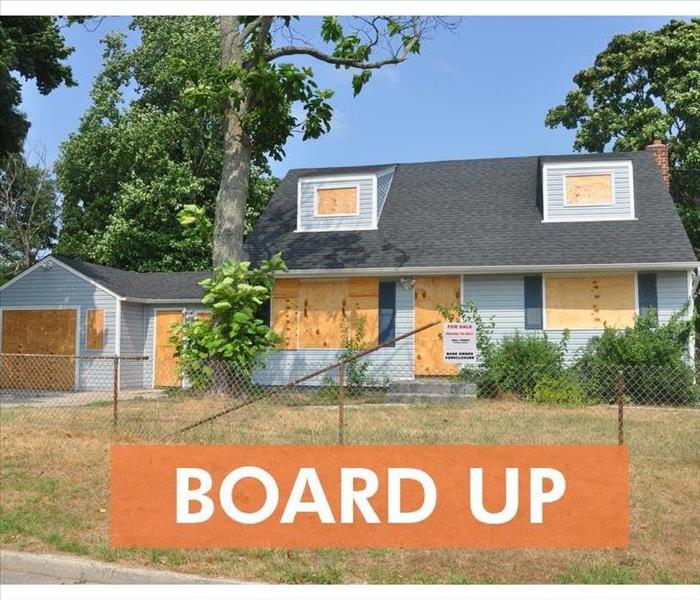 Board up home in Hardin Valley, TN
Board up home in Hardin Valley, TN
3 Steps To Take After A Fire
A fire in your home in Hardin Valley, TN, can be devastating. There are people who can give you the assistance you need to rebuild your house if this happens. To expedite the fire restoration process, you will need to file a fire claim with your insurance company. Take these three steps right after the fire happens to make the process go more smoothly.
1. Call Your Insurance Agent
The company that provides your fire insurance is the first call you should make after the flames have been put out. This starts the claims process. An adjuster comes to assess the damage and determine how much the insurance company will pay. The longer you wait to contact your insurance company, the higher the chance that your home will sustain damage that won't be covered.
2. Vacate Your Property
You may be tempted to start cleaning up the moment you hang up from the call with your insurance agent. Fight this urge and leave damage mitigation to the professionals. Instead, take pictures of the damage so that you have an accurate record of them. You may also consider making a list of items that need to be replaced and the approximate replacement cost. This can help you when you are filing your claim, especially if the fire restoration cleanup starts before your adjuster arrives.
3. Protect Your Home
It's likely that the fire that ravaged your home also left it vulnerable to the elements and unwanted guests. When fire remediation specialists arrive to start the smoke cleaning process, they will likely board up the parts of your home that normally would be closed to intruders, animals or bad weather. This can prevent further damage and save you the time and expense of extra repairs.
Fire damage to your home can seem overwhelming. However, there are only a few steps needed to start the fire restoration process.
Four Common Causes of House Fires
10/9/2019 (Permalink)
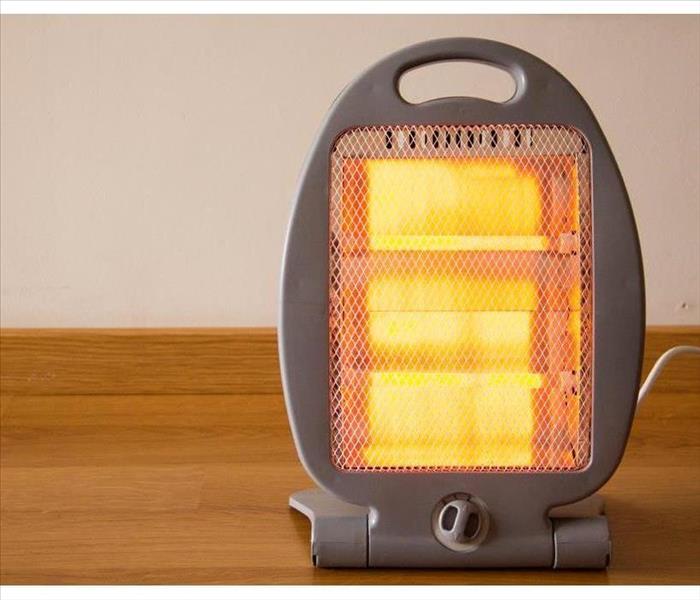 Space heaters cause numerous fires each year
Space heaters cause numerous fires each year
Four Common Causes of House Fires
A fire in your Rocky Hill, TN, home is a frightening prospect. Fortunately, knowing some common causes of residential fires can help you stay vigilant and prevent a home fire. The following are frequent fire causes in the United States:
1. Cooking Because of the heat involved and how often people cook, kitchen fires are very common. Grease fires are particularly difficult to extinguish, so be vigilant when using oil or cooking something, such as bacon, that creates its own grease. Never try to put out a grease fire with water because this can cause the grease to combust. Additionally, toasters and other small kitchen appliances can cause fires if they are not properly cleaned and maintained. Don’t allow crumbs and grease to build up, and make sure power cords remain in good condition.
2. Faulty Wiring Electrical fires are particularly dangerous because they often begin in non-visible locations, such as behind walls. To minimize the risk of a home fire, make sure to have the wiring in your home inspected every 5-10 years. Your electrician can tell you how frequently your home needs an inspection. If you notice any discoloration on an electrical outlet, discontinue its use and call an electrician.
3. Heaters Space heaters, both gas and electric, cause numerous fires each year. It is important to follow the directions and never leave the appliance unattended. Also, keep a safe distance between the heater and anything that could catch fire, such as curtains.
4. Smoking Fires from cigarettes are especially deadly because they often begin when the homeowner is asleep. Never smoke in bed. If you can, smoke outdoors. Otherwise, make sure to use an ash tray.
Hopefully, with a little vigilance and knowledge of common fire causes, you can prevent a fire. However; if you ever do experience a home fire, you may need a professional restoration team to provide fire cleaning and get your house back to pre-fire condition.
Teach Your Children To Safely Escape a Home Fire
7/17/2019 (Permalink)
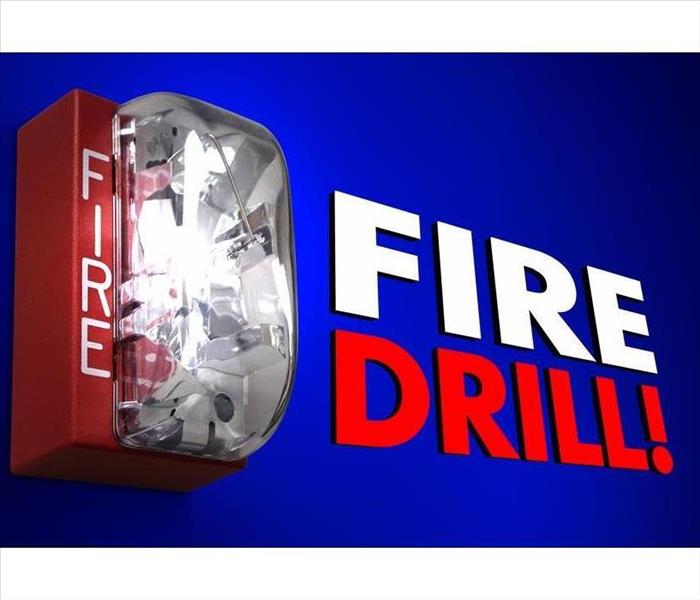 Hold regular drills so your entire family knows how to respond to the sight of flames
Hold regular drills so your entire family knows how to respond to the sight of flames
Teach Your Children To Safely Escape a Home Fire
Any Ebenezer, TN, home is susceptible to fire damage, so it's vital that all children are taught how to escape a fire. As a cautious parent or guardian, it's up to you to create a plan and protect your kids safety. Your plan should consist of these elements:
- Recognizing the sound of fire/smoke alarms
- Familiarity with exit routes and alternatives
- Where to meet outside the home
Hold regular drills so your entire family knows how to respond to the sight of flames or the sound of the alarm at any time of day or night.
Install Voice Alarms
Did you know that many children won't wake up when smoke and fire alarms go off during the night? In recent years, studies found that at least 80 percent of children don't wake up even if the home fire alarm is sounding right in their bedroom. Today, smoke detectors are equipped with voice alarms which are much more effective at rousing children from their sleep. Consider replacing bedroom alarms with these new devices for your kids safety.
Consider Several Scenarios
Draw up a fire escape plan that gets the family out within just a minute or two. Ideally, children should sleep with their doors closed. As part of your exit plan, make sure children know how to respond if their doorknob is hot. Provide alternative escape plans in the event the original route is blocked. During your drills, practice methods of getting out of bed safely; teach children to roll out of bed to avoid smoke inhalation.
Stay Out of the House
In the emotional moments after escaping a home fire, adults and children may suddenly realize that a treasured belonging is in danger of fire damage. It is crucial, however, that family members do not go back into the home. When you are all gathered safely at your meeting point, support each other in remaining safely out of the home.
Once the flames have settled and fire cleanup efforts are underway, your kids safety is still your top concern. Fire damage cleanup professionals will focus on returning your home to its condition before fire damage occurred.
Interruption Insurance Coverage and What It Can Do for You
6/26/2019 (Permalink)
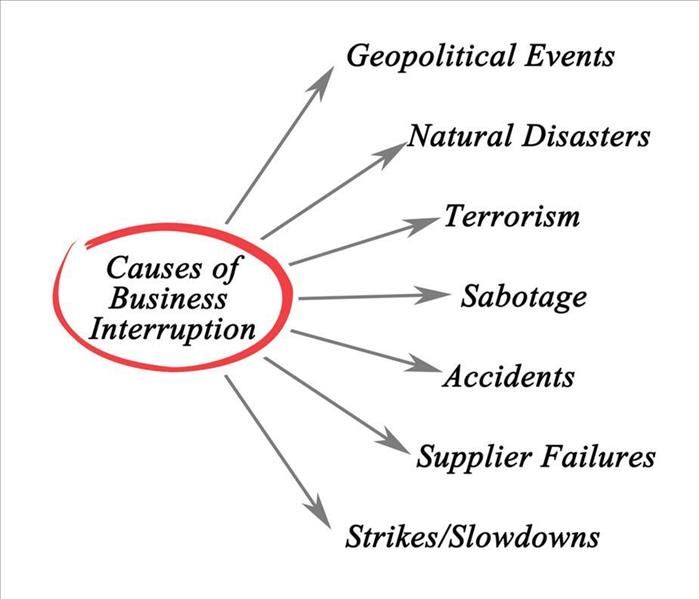 Interruption insurance coverage is a valuable resource for the business owner
Interruption insurance coverage is a valuable resource for the business owner
You’ve worked hard to establish your company in Hardin Valley, TN, and as a result, business is going well. Have you considered, however, what you would do in the unfortunate event that a fire or a natural disaster ravaged your facility, temporarily putting you out of business? Interruption insurance coverage on your business policy, also known as business income coverage, is valuable and will make it easier for you to resume business by compensating you for loss of income or profits during the business interruption.
What Is This Insurance?
Business income coverage provides compensation for the following:
- Profits that could have been earned had this loss not occurred
- Normal operating expenses while the business is closed, including employees’ wages
- The cost of relocation to a temporary site in order to conduct business
This type of insurance applies when a fire or other property damage covered under the insurance policy causes a business to reduce or completely stop operations. While property insurance may cover the actual damage to the building, it does not cover the loss of income or profits resulting from the diminished business operations. During the time the property damage is being repaired or replaced, interruption insurance is in effect.
What About Additional Expenses?
An additional coverage, known as extra expense coverage, may be included with the business income coverage. It applies to additional expenses unrelated to the actual damage, such as the higher cost of rent at a temporary site used to conduct business.
What Should I Do After I Call My Insurance Company?
Hopefully, a fire will never erupt at your office or facility, making it necessary for you to ever have to use your business income coverage. In the event that it does, however, a company specializing in fire restoration is Here to Help and can make your working area look “Like it never even happened.”
Interruption insurance coverage is a valuable resource for the business owner. Along with extra expense coverage, this insurance provides peace of mind and enables a company to proceed with business more effectively during a time of transition.
Types of Fire Extinguishers and Their Uses
6/14/2019 (Permalink)
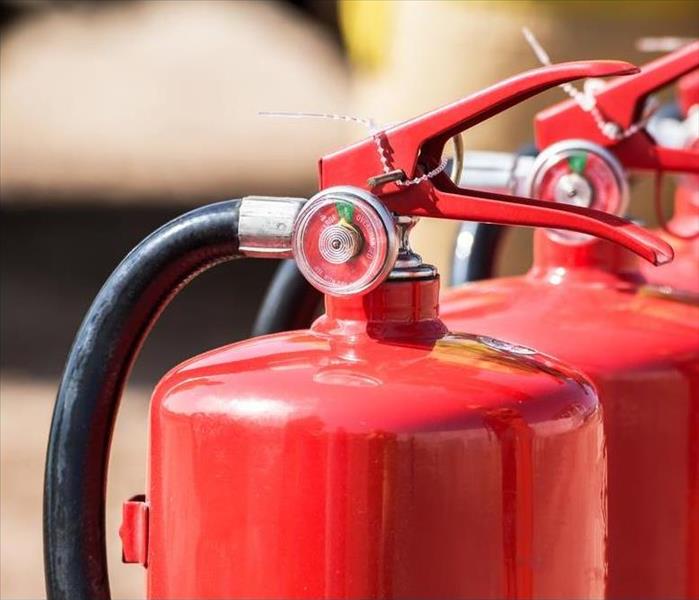 For the safety of your home and family, it’s crucial to have the correct fire extinguisher on hand for the most common fire hazards.
For the safety of your home and family, it’s crucial to have the correct fire extinguisher on hand for the most common fire hazards.
Many people are unaware that there are different kinds of fire extinguishers for home use in Knoxville, TN. Different kinds are designed to fight certain types and sizes of fire. For the safety of your home and family, it’s imperative to have the correct fire extinguisher on hand for the most common fire hazards.
Classes
A home extinguisher will be labeled by class based on the type of fire it is meant to fight.
• Class A varieties are designed for solid objects such as wood, fabric, and paper.
• Class B extinguishers are for fighting flammable liquid fires from sources like gasoline, grease, and oil.
• Class C versions are designed for electrical fires.
Most popular kinds found in home improvement stores will be combination types, labeled to indicate the use. For example, an ABC extinguisher will work on solid material, liquid, and electrical fires.
Sizes
In addition to the class, the size of fire extinguisher is an important factor. As a general rule, the larger the better. The weight listed on the label indicates the amount of fire retardant in the canister. Add a few more pounds to account for the canister’s weight. Consider an extinguisher that is not too heavy to be easily lifted and maneuvered.
Coverage
There are often numbers found before the letters on the label. The number signifies extinguishing power. Each number found before an A is equivalent to 1 ¼ gallons of water. For example, an extinguisher classified as 3-A is equipped with the equivalent of 3 ¾ gallons of water.
A number found before B and C equates to coverage in square feet. A 40-B:C classification, for example, indicates the ability to put out a fire of up to 40 square feet.
Fire preparedness is essential in minimizing home fire damage should a blaze start. With so many options available when purchasing an extinguisher, it is helpful to know how to interpret the information found on the label. Having an understanding of classes, sizes and fire-fighting power will help you choose the appropriate fire extinguisher to protect your home, family, and property.
What To Do When Grease Ignites
5/17/2019 (Permalink)
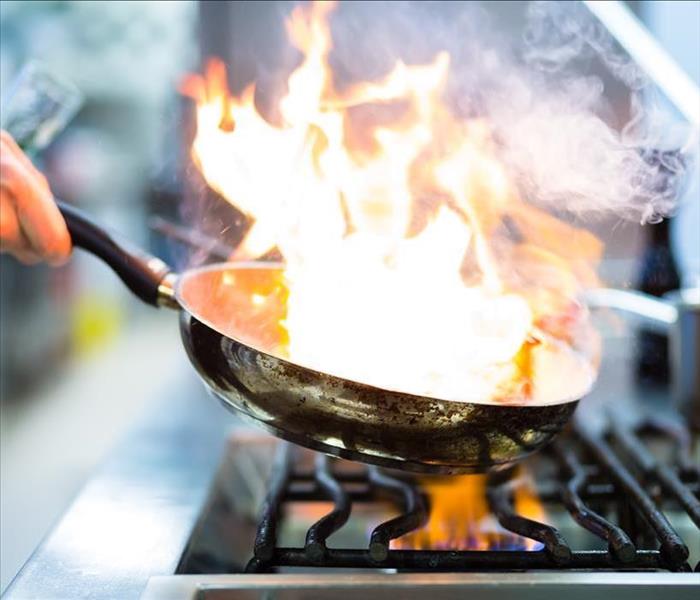 Cut off the heat source as soon as grease starts to smoke
Cut off the heat source as soon as grease starts to smoke
Hot grease, such as cooking oil or fat, is quick to ignite. Fat and oil tend to smoke before a fire starts. You should take the following measures to extinguish a grease fire.
Stop Heating the Oil
Cut off the heat source as soon as grease starts to smoke. There are several guidelines depending on the type of fat or oil:
- Animal fats smoke around 375 degrees Fahrenheit
- Vegetable oils smoke around 450 degrees Fahrenheit
- Do not add water to any hot grease
It may be possible to avoid a fire by turning off the heat and covering smoking grease. Adding water to grease can cause a splash that spreads fire.
Cut Off Oxygen
Limiting the availability of oxygen is the best way to extinguish a grease fire. Completely cover a burning pan or pot with any of the following items:
- Baking sheet
- Metal lid
- Another metal pan or pot
Leave the cover undisturbed for up to 20 minutes. Simple kitchen ingredients can also be used to douse grease fires.
Douse the Flames
You can dump baking soda and salt on a fire before covering the flames. Baking soda releases carbon dioxide and salt absorbs heat. A large amount of these ingredients may be necessary. A Class B or K extinguisher is also useful for grease fires. Avoid spraying an extinguisher directly at flaming grease, as pressurized suppressant may spatter grease and spread a fire.
Seal Off the Fire and Evacuate
If the fire spreads and cannot be suppressed, close the door to the kitchen to limit air flow. Evacuate the premises and call the fire department.
These are the most effective methods for putting out a grease fire. When you are dealing with damage resulting from any type of fire at your home in Bearden, TN, you should contact a fire cleanup company that specializes in mitigation and restoration.
Smoke Alarms Save Lives
3/31/2019 (Permalink)
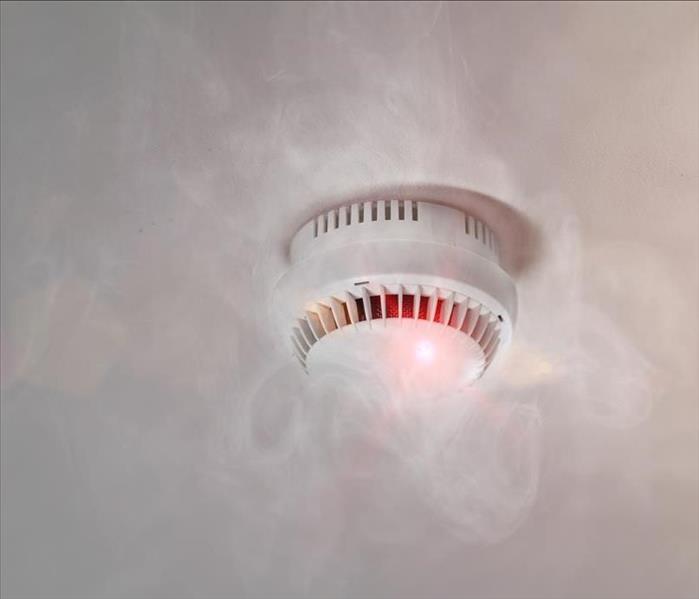 Smoke Alarm West Knoxville
Smoke Alarm West Knoxville
Smoke alarms save lives when properly installed and maintained, according to the National Fire Protection Association (NFPA).
In homes, smoke alarms should be in every bedroom, outside each sleeping area, and on every level, including the basement. Extra smoke alarms may be needed in large homes.
Test smoke alarms monthly using the test button. Smoke alarms with non-replaceable batteries need the entire smoke alarm unit replaced every ten years. Other alarms need batteries replaced every year, and the group replaced every ten years. If the alarm chirps are signaling low battery, take the proper steps to replace the unit or the batteries immediately.
Never disable or remove the battery from an alarm. Almost half of the fires where smoke alarms were present but did not activate had missing or disconnected batteries (NFPA).
If you need help installing, testing or changing batteries in your smoke alarms, contact your local fire department, an electrician or the American Red Cross.
Be sure your home has a fire emergency plan in place and conduct regular fire drills with your family.
For more information on Emergency Preparedness, contact your local SERVPRO® of West Knoxville/ Farragut Professional.
Heating Safety Tips
2/17/2019 (Permalink)
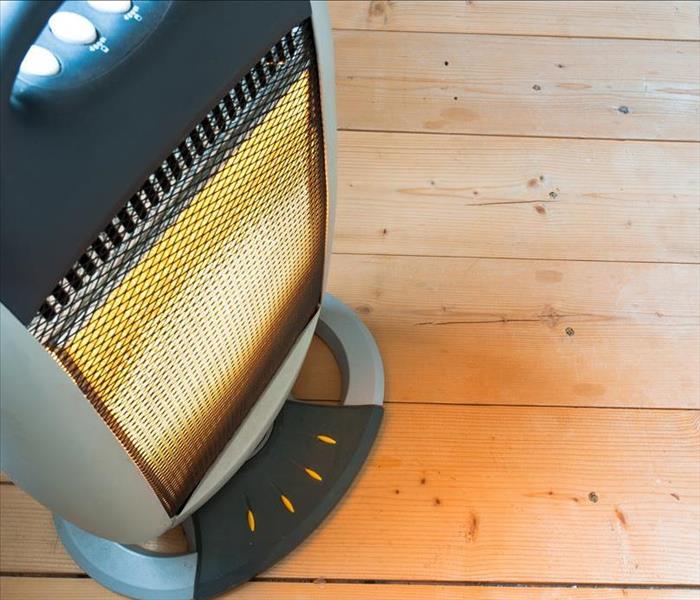 Heaters Can Cause Fire Damage
Heaters Can Cause Fire Damage
Keep anything flammable at least three feet away from heating equipment, like the furnace, fireplace, wood stove or a portable space heater. Have a three foot “kid-free zone” around open fires and space heaters.
-Make sure the fireplace has a sturdy screen to stop sparks from flying into the room. Ashes should be cool before putting them in a metal container. Keep the container a safe distance away from your home.
- Remember to turn portable heaters off when leaving the room or going to bed.
-Test smoke alarms monthly.
-Always use the right kind of fuel, specified by the manufacturer, for fuel-burning space heaters.
- Have heating equipment and chimneys cleaned and inspected every year by a qualified professional.
If your property does suffer fire damage, contact SERVPRO® of West Knoxville/Farragut.
3 Steps To Smother a Grease Fire
2/4/2019 (Permalink)
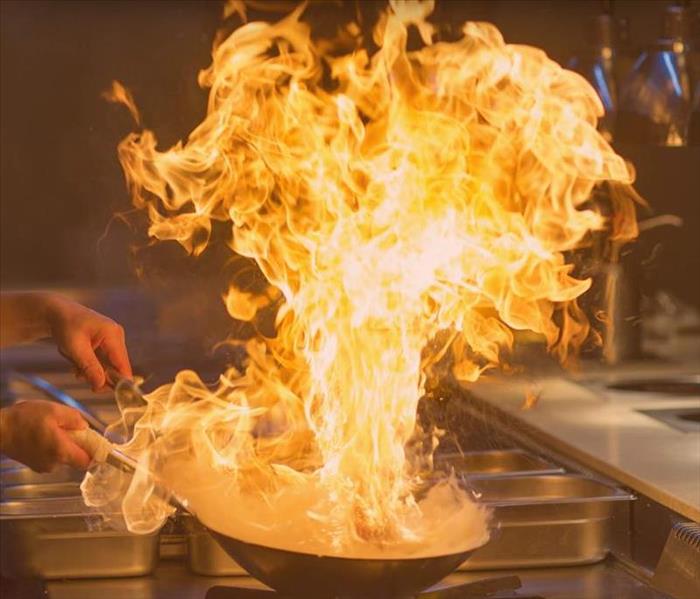 Grease fire can burn hotter that other types of kitchen fire
Grease fire can burn hotter that other types of kitchen fire
3 Steps To Smother A Grease Fire
Grease fires can burn hotter than most other types of kitchen fires. It is important to know how to safely extinguish these fires, as using a pressurized fire extinguisher may actually cause this type of fire to spread. Here are the three steps necessary to safely smother a grease fire.
1. Turn Off the Heat
The first step to handle smoking grease or a fire is to turn off the source of heat. This can prevent grease from becoming even hotter. Do not attempt to move a pan or pot off of the burner, as motion can intensify the fire.
2. Smother the Flames
There are two effective ways to quickly smother flames. It is a good idea to keep baking soda and salt handy if you are cooking with large amounts of grease. Baking soda consists of sodium bicarbonate, which releases carbon dioxide. Salt draws heat out of grease to limit its combustibility.
An intense grease fire will draw in oxygen through convection and may resist this smothering effect. Limit the supply of oxygen by immediately covering the pot or pan with a metal lid, cookie sheet, or another pot or pan.
3. Make Sure the Fire Is Out
Monitor the situation to make sure that a fire is not spreading. Wait at least 20 minutes for grease to cool before checking the condition under the cover. Lifting a cover too quickly can introduce a surge of oxygen that may cause a fire to reignite.
These steps should make it possible to safely contain a grease fire, which will limit safety risks and property damage. In the event of a fire that is too intense to smother, close the doors leading to the kitchen and evacuate. Any type of fire can result in extensive damage. If this occurs, contact a fire cleanup and restoration service located in Bearden, TN.
How a Post-fire Board Up Can Protect Your Home
12/30/2018 (Permalink)
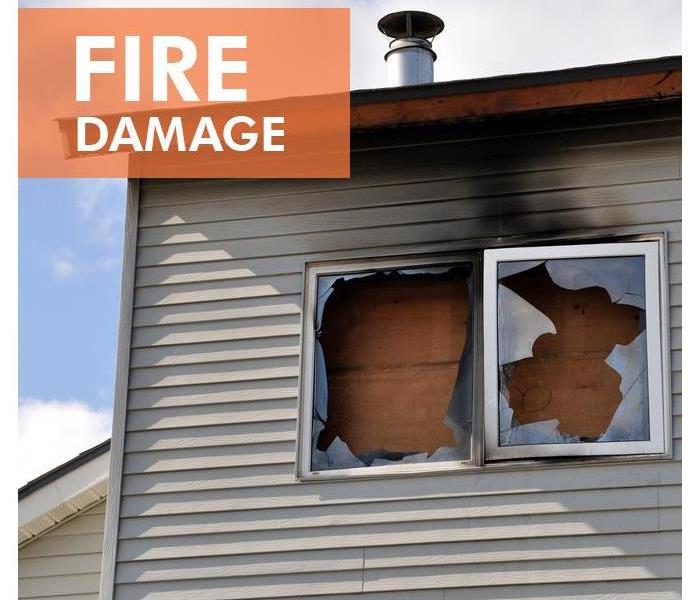 Using an emergency board up to protect your home can help prevent other kinds of loss as well
Using an emergency board up to protect your home can help prevent other kinds of loss as well
How a Post-fire Board Up Can Protect Your Home
If your Bearden, TN, home has suffered a fire then you may be wondering if it’s necessary to board up the building. Many fire damage restoration professionals recommend using tarps or boards to cover the damaged areas of your home for several reasons.
1. Helps Prevent Further Damage
On its own fire damage may leave you with costly repairs, but it can also leave your home open to other elements that can cause further damage. Using tarps and boards to cover the damaged areas can help prevent flooding from rain or snow, wind damage, and even animal intrusion. Covering damaged areas may also make it easier to conduct repairs one section at a time.
2. Helps Maintain Your Insurance Coverage
When you board up your home after a fire you may also be following the requirements of your insurance provider. Protecting your home against additional damage can be considered part of your responsibilities as the homeowner. Failure to do so could cause problems with your claim. In many cases your insurance provider may have professionals they recommend for the job.
3. Helps Prevent Additional Loss
Using an emergency board up to protect your home can help prevent other kinds of loss as well. Boarding over the damaged areas may dissuade intruders from taking advantage of the opportunity to get inside via an unprotected opening. Boarding over damage is also one way to show that the home has not been abandoned, and will be receiving repairs.
Constructing a board up over the damaged areas of your home after a fire can help you in a number of ways. This practice can help protect your home against further damage, help dissuade intruders from taking advantage of damaged areas, and in some cases help maintain your insurance coverage. If you are unsure how to properly cover the damaged area, a professional may be able to help.
Safety First Before You Eat
11/26/2018 (Permalink)
Each November, families gather to celebrate Thanksgiving by preparing a delicious feast, but if you don’t practice safe cooking habits, your happy holiday could become hazardous very quickly.
According to the National Fire Protection Association, cooking is the main cause for home fires and injuries, with Thanksgiving being the peak day for cooking-related fires.
Review the following safety tips to help ensure you can enjoy a safe holiday.
-Never leave cooking food unattended–stay in the kitchen when frying, grilling or broiling food. If someone must leave the kitchen for even a short period of time, they should turn off the stove.
-Check food regularly while cooking and remain in the home while cooking. Use a timer as a reminder that the stove or oven is on.
-Keep the kids away from the cooking area. Enforce a “kid-free zone” and make them stay at least three feet away from the stove.
- Keep anything flammable–pot holders, oven mitts, wooden utensils, paper or plastic bags, food packaging, and towels or curtains—away from the stove, oven or any other appliance in the kitchen that generates heat.
-Do not wear loose clothing or dangling sleeves while cooking.
-Clean cooking surfaces on a regular basis to prevent grease buildup.
- Purchase a fire extinguisher to keep in the kitchen. Contact the local fire department for training on the proper use of extinguishers.
-Always check the kitchen before going to bed or leaving the home to make sure all stoves, ovens, and small appliances are turned off.
-Install a smoke alarm near the kitchen, on each level of the home, near sleeping areas and inside and outside bedrooms. Use the test button to check it each month. Replace all batteries at least once a year.
SERVPRO® of West Knoxville wishes you a safe
and happy holiday season.
Celebrate Summer Safety
6/30/2018 (Permalink)
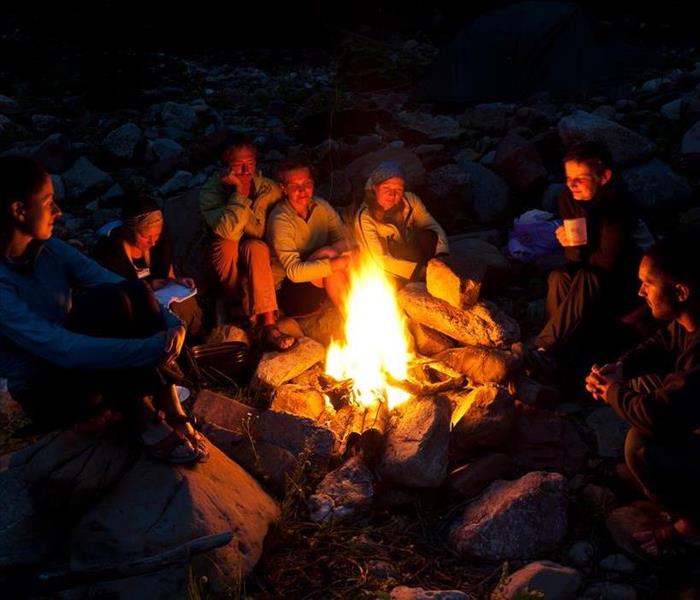 Campfire
Campfire
Summer is a time to enjoy the great outdoors, but it is also important to keep safety in mind. Consider the following tips, provided by the National Fire Protection Association, to keep you and your family safe all summer long.
-When using a charcoal grill, only use starter fluids designed for barbecue grills: do not add fluid after coals have been lit. When using a gas grill, ensure the hose connection is tight; check hoses for leaks. Applying soapy water to the hose will easily and safely reveal any leaks. When camping always use a flame-retardant tent and set up camp far away from the campfire.
-Always build campfire downwind from the tent area. Clear vegetation and dig a pit before building your fire. Extinguish the fire before going to sleep or leaving the campsite.
-Store liquid fire starter (not gasoline) away from your tent and campfire and only use dry kindling freshen a campfire.
Be Prepared This Summer
6/25/2018 (Permalink)
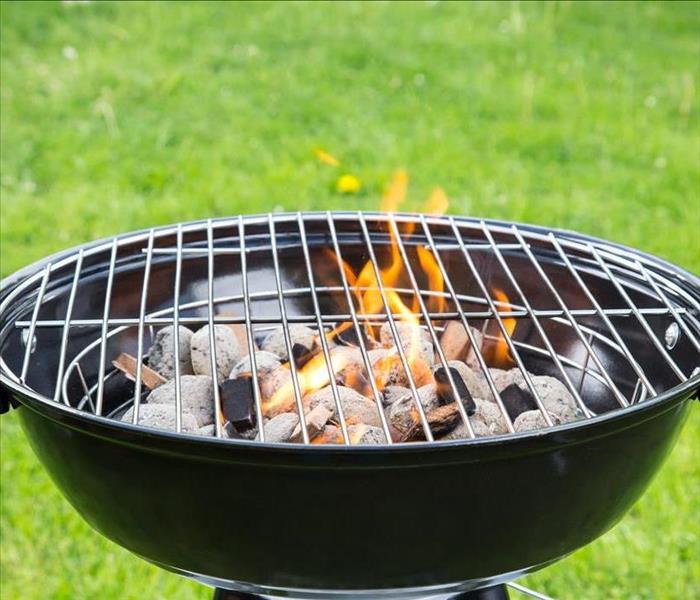 Grill Fire
Grill Fire
Each year, families and friends across the country enjoy the summer months with barbecues, camping trips, or by cooling off in a pool or lake. To enjoy these occasions, it is important to keep safety top of the mind to ensure you have fun in the sun.
According to a recent study by U.S. Consumer Product Safety Commission, nearly 11,900 Americans were injured by fireworks in 2015., with the majority happening in the month surrounding the Fourth of July. Another 8,700 are injured by charcoal/wood-burning and propane grill fires. A grill should always be supervised when in use. Keep children and pets a safe distance from the grilling area to prevent accidental burns or tipping of the grill.
Grills also cause an average of 8,9000 home structure or outdoor fires. "These fires caused an annual average of 50 civilian injuries and $2 million in direct property damage," according to the National Fire Protection Association (NFPA).
If you enjoy lounging by the pool or going for a boat ride to cool off from the summer sun, make sure you exercise caution, especially when children are present. Only swim in approved areas and supervise children at all times when near water.
The summer season should be time to make memories and enjoy the great outdoors. Don't become a statistic. Take precautions to prevent these events from putting a damper on your summer months!
Faster To Any Disaster
5/28/2018 (Permalink)
 SERVPRO can fix it!
SERVPRO can fix it!
There is no disaster that hits home quite like a disaster to your property, home or business. When you have suffered a fire and water or mold damage, you don't have time to waste searching for a company to fix your property. When disaster strikes, depend on SERVPRO of West Knoxville to fix it.
Whether the job is big or small, SERVPRO of West Knoxville will be there to help make it "Like it never even happened." so you can get back to your home or business and on with your life.
SERVPRO of West Knoxville has experts who deal with mold mitigation and remediation process and what may take place if you are dealing with mold loss. As well as expertise in biohazard, crime scene, and vandalism cleanup. Whatever it maybe you can count on SERVPRO of West Knoxville.
The Importance of Cleaning Dryer Vents
5/14/2018 (Permalink)
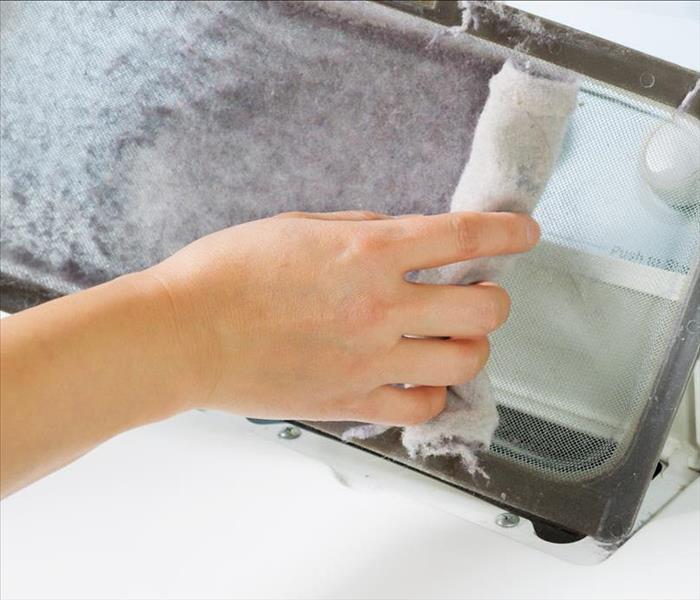 Clean your dryer vents
Clean your dryer vents
According to FEMA, failure to clean home dryers causes 34% of home dryer fires. Home dryer fires cause $35 million in property loss and can even cause injury or death. To reduce the risk of these fires happening in your home, SERVPRO® of West Knoxville can help clean dryer vents and ducts that may have lint buildup. Other tips for keeping your dryer vents clean from the National Fire Protection Agency include cleaning the lint filter before and after each load and making sure the outdoor vent flap will open and is not
restricted by snow, a bird’s nest, or other potential obstacles.
Our certified professionals will come out for a free estimated.For more information on cleaning dryer vents, contact
SERVPRO® of West Knoxville.
Safety Tips for Your West Knoxville Home Fireplace This Winter
1/30/2018 (Permalink)
A fireplace is a wonderful thing to have during the cold and wet winter months here in Knoxville. They lend a cozy ambience to any home, large or small, and the mantle of a fireplace is a great place to put holiday decorations, greeting cards, and pictures from holiday celebrations. But your fireplace needs to be properly maintained, as they can also be dangerous and serious fire damage hazard. Here are some helpful suggestions.
TIPS:
- Have smoke and carbon monoxide alarms installed throughout the home and keep them in working order at all times.
- Ensure that materials such as carpet, drapes, and furniture are kept away from the fireplace while it is in use. All of these materials are combustible and must be watched carefully to avoid fire damage to your home. Use a firescreen to keep children and pets away from the flames and to make sure that sparks are not projected near anything that could catch fire.
- Keep the ash accumulation under control, cleaning it out when it reaches the bottom of the grate. This can impede air flow and also make building your fire more difficult. When removing ash, it’s a good idea to wear a dust mask and gloves.
- A certified sweep in the Knoxville area can inspect and clean your wood-burning fireplace and chimney; once a year or more can keep you and your family safe. The Chimney Safety of America maintains a list of approximate 1500 chimney professionals that actively care the Certified Chimney Sweep credentials. They can be contacted in 49 of the 50 states.
- A good way to test the safety of your fireplace is by lighting a few small pieces of seasoned wood. If the smoke doesn’t exit up into the chimney but goes out into the room, immediately troubleshoot and correct any problems. These can include: creosote or soot buildup, debris in the chimney such as bird or animal nests, a closed or partially closed damper, or even wood that is damp; all of which can pose serious fire hazards and risk fire damage.
- Make sure you burn only seasoned wood. This is wood that has been cut and dried under cover for 6 -12 months. Green wood does not burn as thoroughly and creates more soot and creosote buildup, creating problems with your fireplace. Hardwoods, such as oak, ash, and maple are dense and heavy, delivering more heat than lighter softwoods, such as pine, poplar, and cedar; you should have no problems finding these woods from a plethora of different sources in the Knoxville area.
These simple tips can keep your fireplace safe and in working order all winter long. And remember to call SERVPRO of West Knoxville/ Farragut at (865) 690-9658 or visit http://www.SERVPROwestknoxvillefarragut.com/ if you need any help with water damage, fire damage, or mold cleanup around your home or office this chilly winter season!
Be Disaster Aware Take Action To Prepare
11/2/2017 (Permalink)
The regular occurrence of natural disasters demonstrates the importance of being prepared for any emergency or disaster. While each situation is unique, your family can be better prepared if you plan carefully, put emergency procedures in place, and practice for all kinds of emergencies.
The following are measures you and your family can take to start getting ready. A commitment to begin planning today will help support your family, home, and the community. Review the following questions to learn if your family and home are prepared.
Be Informed
Do you know what kind of emergencies might affect your home or daily life? Do you know what you and your family will do in an emergency situation?
Prepare Your Emergency Plan
Do you have an evacuation and shelter-in-place plan? Do you have a plan to communicate with your family before, during, and after an incident? Do you have an emergency supply kit?
Practice the Emergency Plan
Have you practiced your plan recently? Does your family know where to go in the event of a natural disaster? Have you reviewed your plans in the last 12 months?
Review Insurance Coverage
Have you reviewed your insurance coverage recently to see if you’re covered in a disaster?
Secure Your Home
Have you conducted a room-by-room walk-through to determine what safety measures can be taken?
Improve Cyber Security
Have you installed a firewall on your computer? Do you regularly update your antivirus software?
If you answered “No” to any of these questions, visit ready.gov and learn how to better prepare your family and home for an emergency or natural disaster.
How to Minimize Fire Damage
8/22/2017 (Permalink)
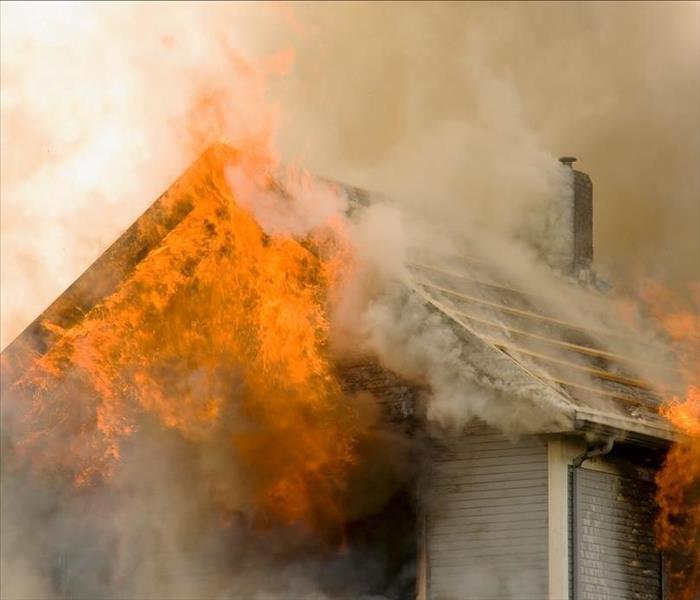 Fire Damage Knoxville
Fire Damage Knoxville
How to Minimize Fire Damage
Minimizing further fire damage is one of the first considerations after a fire in a home or a fire in a business. Commercial fire damage can greatly affect the ability of a business to continue operations. In order to recover as much value as possible from a property that has undergone fire damage, smoke damage, and soot damage, a restoration company should be contacted immediately after the premises are secure. The fire cleanup team can aid in evaluating the damage to the property and listing the items that are present. They can also perform fire damage restoration and offer an estimate onsite.
A restoration company will also be instrumental in boarding up a property if commercial fire damage has compromised any doors or windows. Roofs and walls that may have been cut into by firefighters during the fire may also need to be boarded up. This process can be much more difficult than it originally appears due to the need to evaluate the structural integrity of much of the buildings foundation. A professional contractor should be contacted before an individual attempts to board up his or her own property after a fire in a home or a fire in a business. Boarding up a property that has undergone fire damage is important both to prevent the collapse of the building as well as to protect it from any intruders who may cause additional damage.
The fire cleanup will also involve drying up all the water that firefighters may flood the premises with in order to put out the fire. This water can cause extensive water damage as well as promote the growth of mold. A certified technician can employ all manner of techniques to dry out the property and prevent mold growth using industrial equipment that may include a water extractor, a dehumidifier, and an air current mover. This process will also somewhat remove the smoke smell that may persist after a fire.
After a list of personal belongings have been identified and list along with the property owner, a restoration company can work with him or her to reverse the smoke damage and soot damage that may have settled into the property. Surfaces can often be fully cleaned, even if it is porous like carpet. Deep vacuuming and steam injection are often successful in removing the oily soot that may lead to residual smoke smell. Fire damage restoration requires techniques that require specialized equipment, and these techniques can be discussed with the property owner in order to decide whether or not to proceed with restoration.
If fire damage restoration is not possible on certain items, they may be more easily replaced. In this case, the restoration company will also help to dispose of these items in the appropriate manner. After a fire in a home or a fire in a business, much debris will need to remove anyway. Smoke damage and soot damage is reversible, but property owners sometimes choose to replace items and surfaces instead.
All surfaces are sanitized and cleaned after all soot damage and smoke damage has been reversed. The fire clean up team will also instruct property owners on how to prevent commercial fire damage in the future. Any residual smoke smell will be ventilated until gone. If the smoke smell persists, chemical solutions like an ozone treatment or thermal fogging are also options depending on the needs of the property owner. Additional treatments may be needed weeks or even months after the initial incident.
Fire cleanup is extremely daunting for an individual who is shocked by a fire in a home or a fire in a business. However, fire damage restoration is normal for a fire cleanup specialist, even after extension commercial fire damage. A specialist who has the experience and the expertise to guide a property owner will ensure that fire damage is minimized as much as possible.
RESIPE OF SAFTEY
5/5/2017 (Permalink)
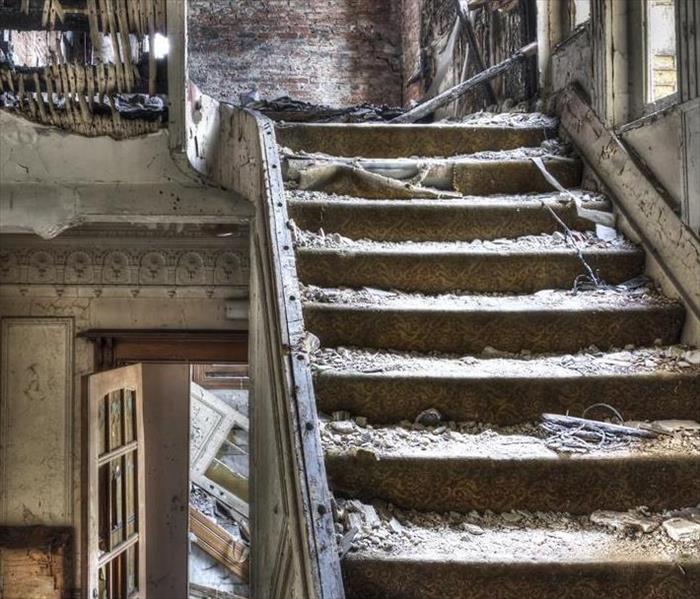 Fire Damage
Fire Damage
Each November families gather to celebrate Thanksgiving by preparing a delicious feast, but if you don’t practice safe cooking habits, your happy holiday could become hazardous. According to the National Fire Protection Association, cooking is the main cause for home fires and injuries, with Thanksgiving being the peak day for cooking-related fires. Review the following safety tips to ensure you can enjoy a safe holiday.
- Never leave cooking food unattended-stay in the kitchen when frying, grilling or broiling food. If someone must leave the kitchen for even a short period of time, they should turn off the stove.
- Check food regularly while cooking and remain in the home while cooking. Use a timer as a reminder that the stove or oven is on.
- Keep the kids away from the cooking area. Enforce a “kid-free zone” and make them stay at least three feet away from the stove.
- Keep anything flammable-pot holders, oven mitts, wooden utensils, paper or plastic bags, food packaging, and towels or curtains- away from the stove, oven or any other appliance in the kitchen that generates heat.
- Do not wear loose clothing while cooking.
- Clean cooking surfaces on a regular basis to prevent grease build up
- Purchase a fire extinguisher to keep in the kitchen. Contact the local fire department for training on the proper use of extinguishers.
- Always check the kitchen before going to bed or leaving the home to make sure all stoves, ovens and small appliances are turned off.
- Install a smoke alarm near the kitchen, on each level of the home, near sleeping areas and inside and outside bedrooms. Use the test button to check it each month. Replace all batteries at least once a year.
HEATING HAZARDS
5/5/2017 (Permalink)
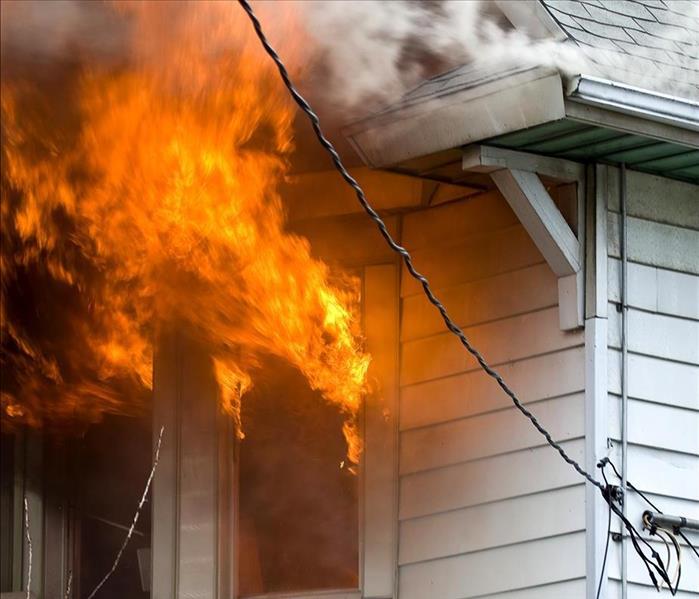 Fire Damage Knoxville, TN
Fire Damage Knoxville, TN
Eliminate Heating Hazards This Winter
The winter season is in full swing! The days are shorter and the temperatures are lower. No matter where you live, winter brings a change in the weather. In a effort to keep our homes and workplaces cozy, many people use alternative heat sources like fireplaces, portable space hearers, and wood burning stoves. According to the Nation Fire Protection Association, heating equipment is responsible for an estimated $893 million in property damage annually. Heating is the second leading cause of residential fire deaths, making it important to review ways to help reduce the risk of a heating-related fire.
- Keep anything flammable at least three feet from heating equipment, like the furnace, fireplace, wood stove, or a portable space heater. Have a three-foot “kid-free zone” around open fires and space heaters.
- Remember to turn portable heaters off when leaving the room or going to bed.
- Always use the right kind of fuel, specified by the manufacturer, for fuel burning space heaters.
- Make sure the fireplace has a sturdy screen to stop sparks from flying into the room. Ashes should be cool before putting them in a metal container. Keep the container a safe distance away from your home.
- Have heating equipment and chimneys cleaned and inspected every year by a qualified professional.
- Have a qualified professional install stationary space heating equipment, water heaters or central heating equipment according to the local codes and manufacturer’s instructions.
- Test smoke alarms monthly.
Halt Winter Heating Hazards In Knoxville
2/8/2017 (Permalink)
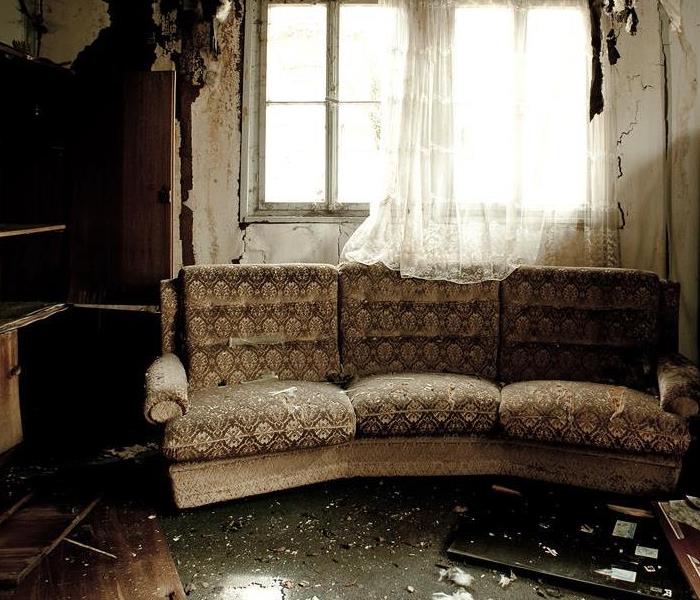 Fire Damage
Fire Damage
The winter season is here and with it comes shorter days and lower temperatures. No matter where you live, winter brings a change in the weather. In an effort to keep our homes and workplace cozy, many people use alternative heat sources like fireplaces, portable space heaters, and wood burning stoves. Did you know, heating equipment is a leading cause of home fire deaths? According to the National Fire Protection Association, heating equipment fires caused an estimated $1 billion in direct property damage annually. Keep the following safety tips in mind to help reduce your risk of a heating-related fire.
- Keep anything flammable at least three feet away from heating equipment, like the furnace, fireplace, wood stove, or a portable space heater. Have a three foot "kid-free zone" around open fires and space heaters.
- Make sure the fireplace has a sturdy screen to stop sparks from flying into the room. Ashes should be cool before putting them in metal containers. Keep the container a safe distance away from your home.
-Remember to turn portable heaters off when leaving the room or going to bed.
-Always use the right kind of fuel, specified by the manufacturer for fuel burning space heaters.
- Have heating equipment and chimneys cleaned and inspected every year by a qualified professional.
- Have a qualified professional install stationary space heating equipment, water heaters or central heating equipment according to the local codes and manufacturer's instructions.
-Test smoke alarms.
FIRE PREVENTION MONTH
10/13/2016 (Permalink)
Fire Prevention Month
October is Fire Prevention Month a perfect time to examine emergency preparedness plans for your home and business, including your fire escape plan. Do you have a fire escape plan? Have you changed your smoke alarm batteries within the last year?
The National Fire Protection Association (NFPA) designates a week each October to focus on fire prevention awareness. The 2016 theme is “Don’t Wait-Check the Date! Replace Smoke Alarms Every 10 Years” designed to educate the public on the basic but essential elements of smoke alarm safety. The NFPA recommends installing smoke alarms in every bedroom outside a separate sleeping area, and on every level of your home, including the basement. Did you know that roughly half of the home fire deaths results from fires reported between 11 pm and 7 am when most people are asleep? Smoke alarm cuts the chances of dying in a reported fire in half!
Avoid Holiday Hazzards
12/23/2015 (Permalink)
Avoid Holiday Hazards
Candles, pretty lights and decorations are just a few of the items that add to the charm and cheer of the holiday season however, if they are not used carefully your holidays may go from festive to frightening very quickly.
Review the following simple safety tips, provided by the National Fire Protection Association to greatly reduce the fire risk in your home or business this holiday season.
Two out of five home decoration fires are started by candles. Keep candles at least 12 inches away from anything that is flammable
Use sturdy candleholders that are not likely to tip over and place candles on clear, uncluttered surfaces. Consider using flameless candles instead of real candles.
Make sure your tree and decorations are at least three feet away from heat sources like fireplaces, radiators, space heaters candles or heat vents.
Make sure you have the correct type of lights for your home. Some lights are designed for only indoor or outdoor use, but not both.
Carefully inspect light strands before hanging them. Replace any string of lights with worn or broken cords or loose bulb connections. Connect no more than three strands of light sets.
Remember to turn off outside decorative lights and Christmas tree lights before leaving or going to bed.
Get rid of your tree after Christmas or when it is dry. Dried-out trees are a fire danger and should not be left in the home or garage, or placed outside against the home. Check with your local community to find a recycling program.
Bring outdoor electrical lights inside after the holidays to prevent hazards and make them last longer.
Prevent Fire Damage in the Winter Months in Knoxville, TN
2/25/2015 (Permalink)
 The House Fire
The House Fire
Every winter we see an increase in the amount of residential house fires in Knoxville, TN, resulting in fire damage. With the winter months come cold weather, and the need to add some extra heat. But along with the extra heat, there are added risks involved.
According to FEMA, the Federal Emergency Management Association and NFPA, the National Fire Prevention Association, half of all home fires caused by heating sources occur in the months of December, January, and February. Additionally, 1 in 6 home fires are a result of heating equipment, and 1 in 5 home fire deaths.
Extra precaution should be used to prevent fire damage and recognize the added risks.
- Keep anything that can ignite and burn at least 3 feet from all heating sources. This includes gas fireplaces, wood burning fireplaces, space heaters, wood stoves, and radiators.
- Never use portable generators inside a residence. The output of carbon monoxide and fumes can be a silent killer.
- Install a carbon monoxide detector and inspect it at least once a month.
- Have a professional inspect your chimney annually to make sure it's operating correctly, and cleaned as needed.
- Never overload outlets with electrical heating sources. No more than one source should be plugged in to one outlet.
- Keep fire extinguishers serviced and up to date.
- If your pipes freeze and burst, be aware of electrical hazards with flooding water.
- Always discard used and cooled ashes properly, a minimum of 10 feet away from houses or any building, using a metal container.
To learn more about SERVPRO of West Knoxville and fire damage services, visit here. For more tips on preventing winter fires and education, visit www.usfa.fema.gov/winter and www.nfpa.org/winter.
Holiday Fire Hazards and Fire Prevention Tips
11/26/2013 (Permalink)
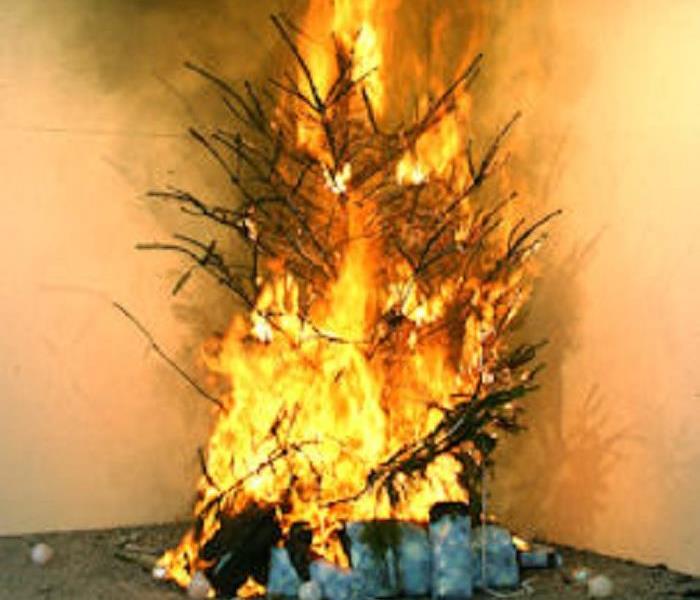 Christmas Tree on fire.
Christmas Tree on fire.
It's the holiday season again. Brightly lit decorations, elaborate meals, and large gatherings are all a part of holiday celebrations. Unfortunately, these annual traditions also cause an average of 230 homes fires each year, with an average of 4 deaths, 21 injuries, and $17.3 million in property damage.
There are about 3 times as many cooking related fires on Thanksgiving Day and almost twice as many on Christmas Day as there on no holidays. Luckily, homeowners can help keep their homes and their families safe during the holiday season by understanding the dangers.
Holiday Cooking Fire Facts from SERVPRO
- Thanksgiving Day has three times the average number of reported home structure fires involving cooking equipment.
- The two other peak days for cooking-related fires are Christmas Day and Christmas Eve.
Holiday Cooking Safety Tips from SERVPRO
- Supervise items on the stovetop. Fifty-eight percent of kitchen fires involve ranges; homes with electric cooktops have a higher risk of fire than homes with gas cooktops.
- Keep flammable items – potholders, packaging, wrapping, wooden utensils, loose clothing – away from the stovetop.
- Don’t let lack of sleep or alcohol consumption affect your ability to concentrate on preparing the meal.
Holiday Decorating Fire Facts from SERVPRO
- Half of all holiday decoration fires start because the decoration is too close to a heat source.
- On average, 32 candle fires are reported each day. December is the peak month for candle fires.
Holiday Decorating Safety Tips from SERVPRO
- Keep all decorations away from heat sources like radiators, portable heaters, and fireplaces.
- Use flameless candles.
- If you do use traditional candles, burn them in sturdy candleholders, well away from drapes and other flammable materials. Never leave them unattended and never allow them to burn down to less than one inch in length.
Christmas Tree Fire Facts from SERVPRO
- 50% of live tree fires occur between December 22 and January 5.
- 31% of tree fires are caused by electrical problems.
- 14% involve decorative lights.
Christmas Tree Safety Tips from SERVPRO
- Keep live trees well watered to reduce the chance of a fire.
- Check wiring on lights for breaks and wear, replace worn strings and don’t exceed manufacturer guidelines for connecting multiple strands of lights.
- Don't leave tree lights plugged in when you are away from home or asleep.
Learn more about fire damage and cleaning here.






 24/7 Emergency Service
24/7 Emergency Service
